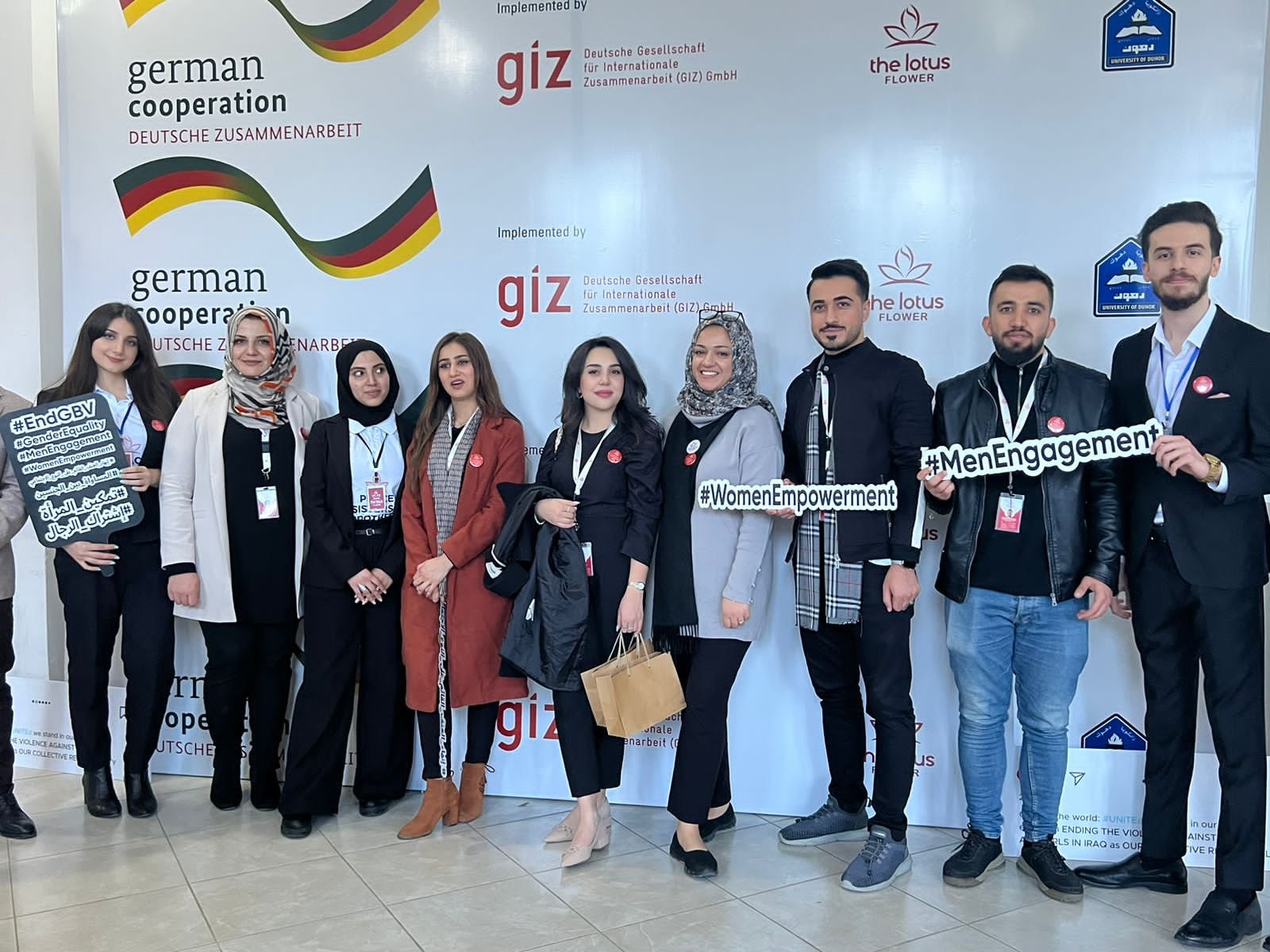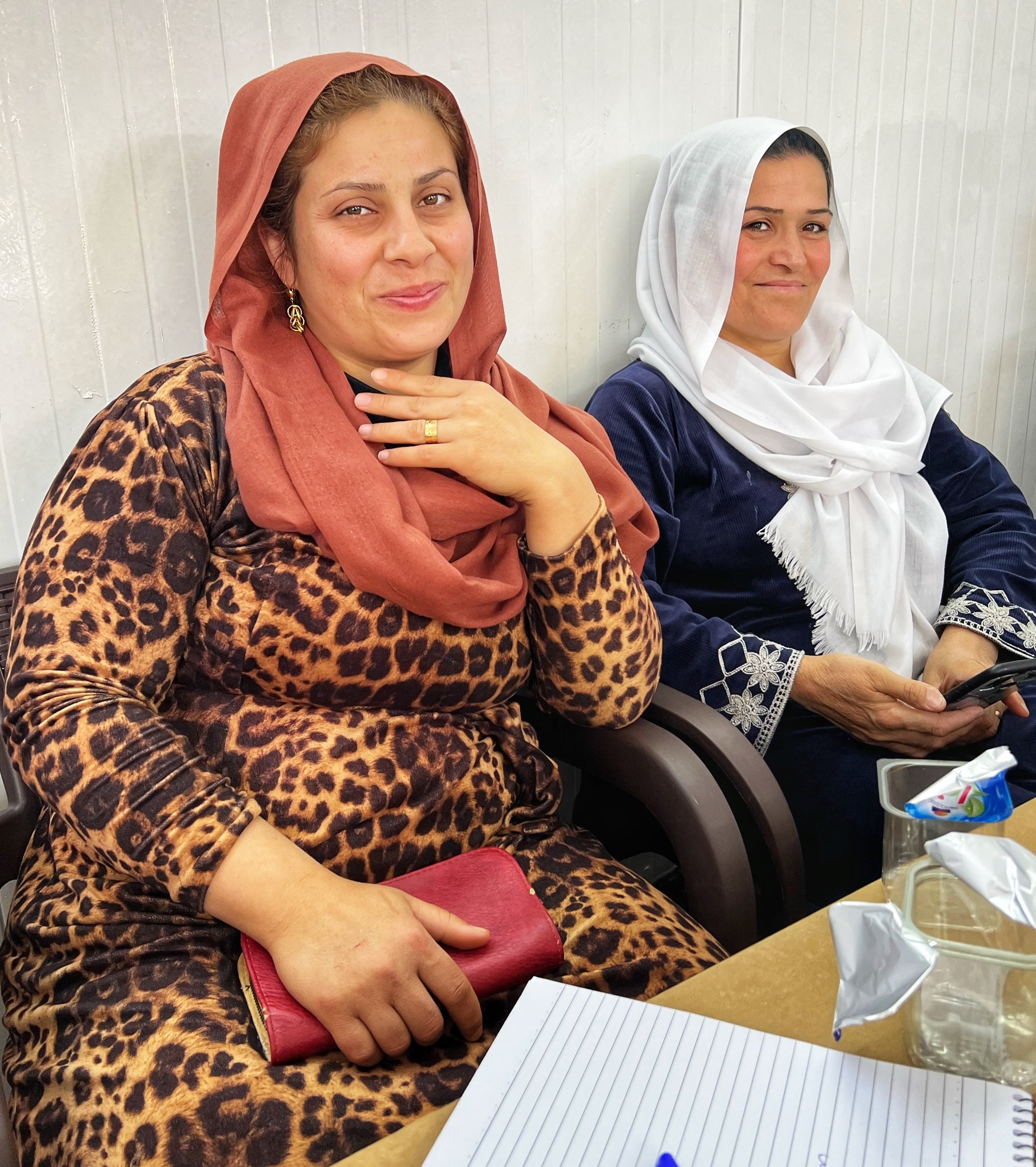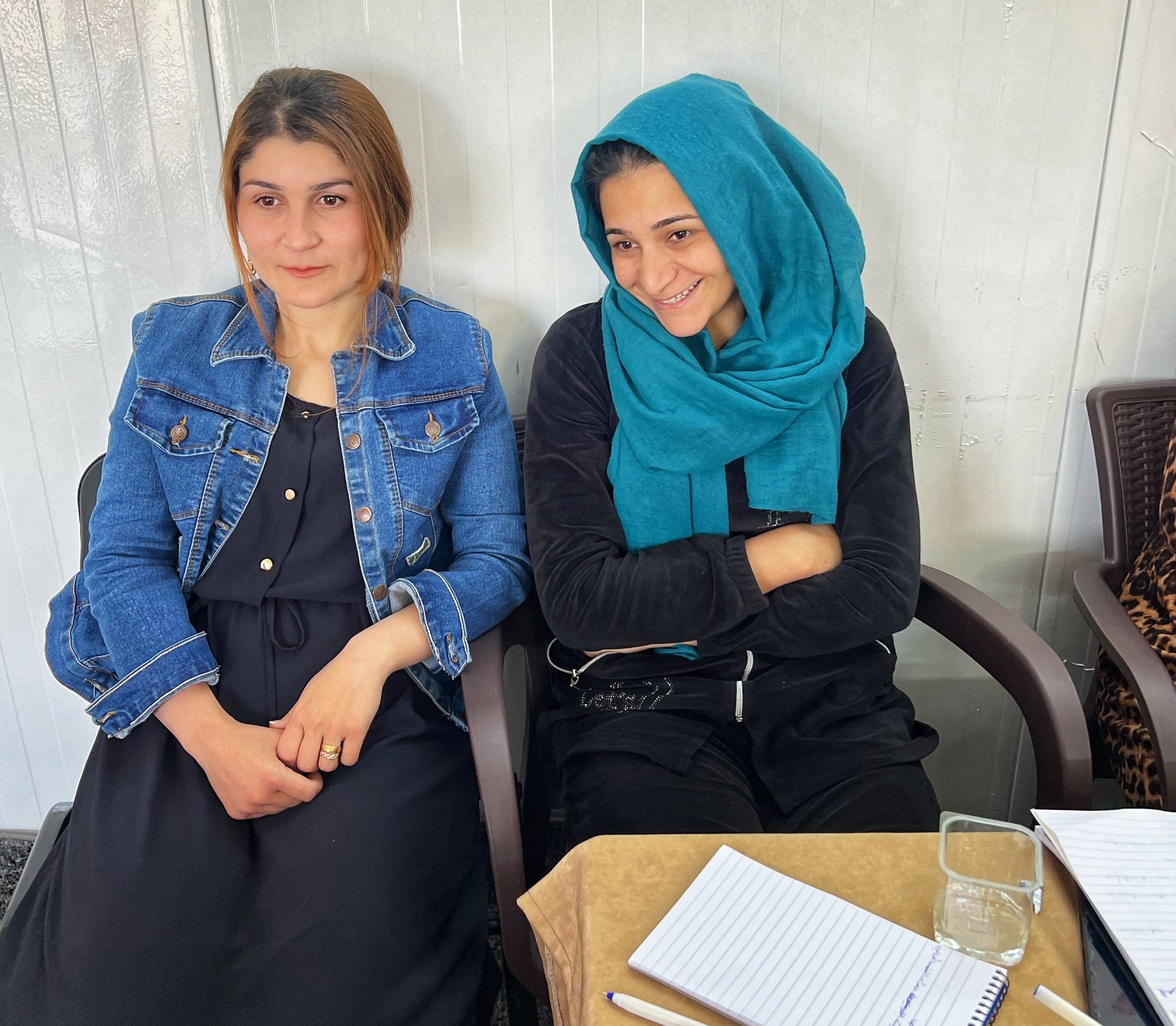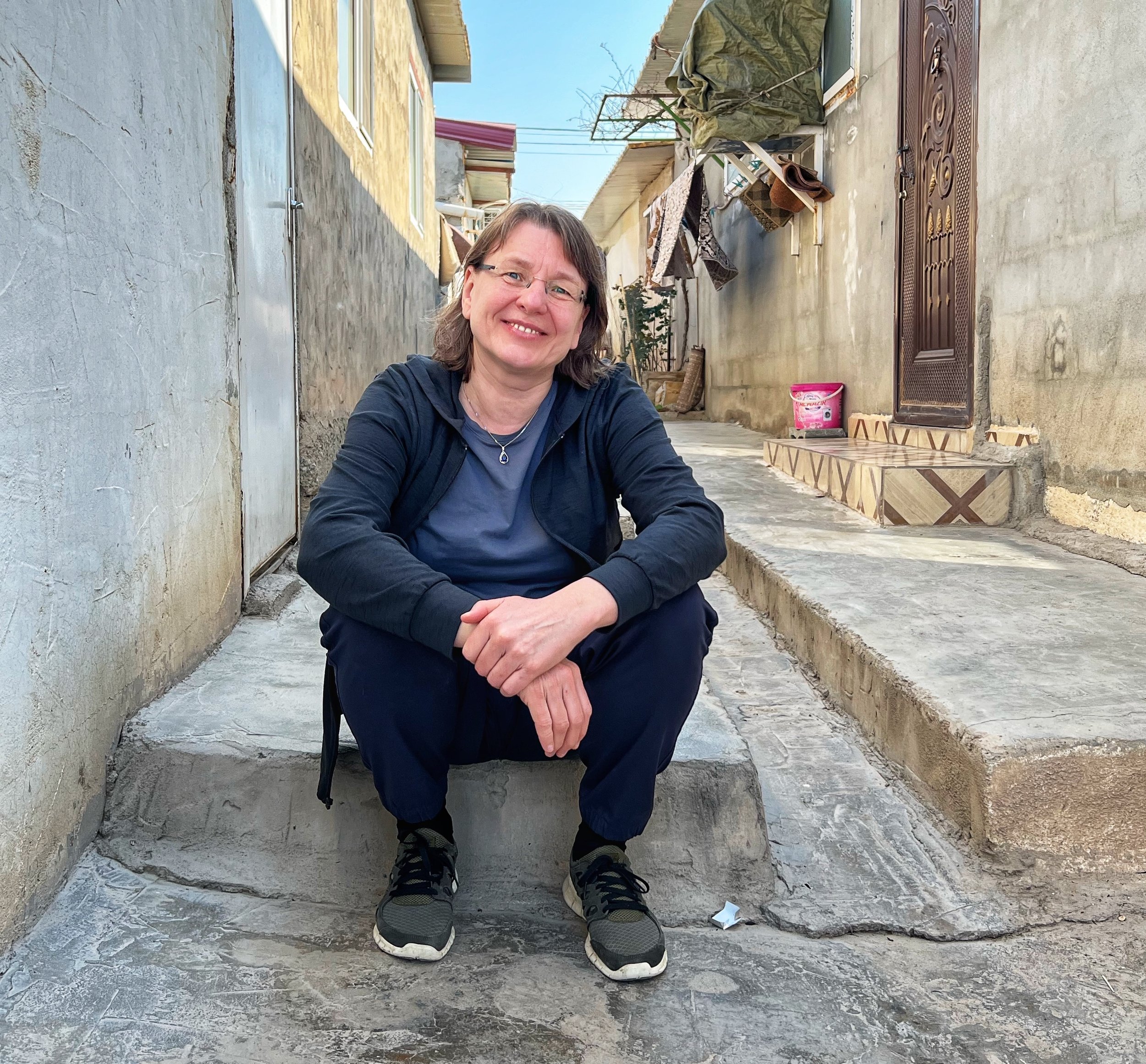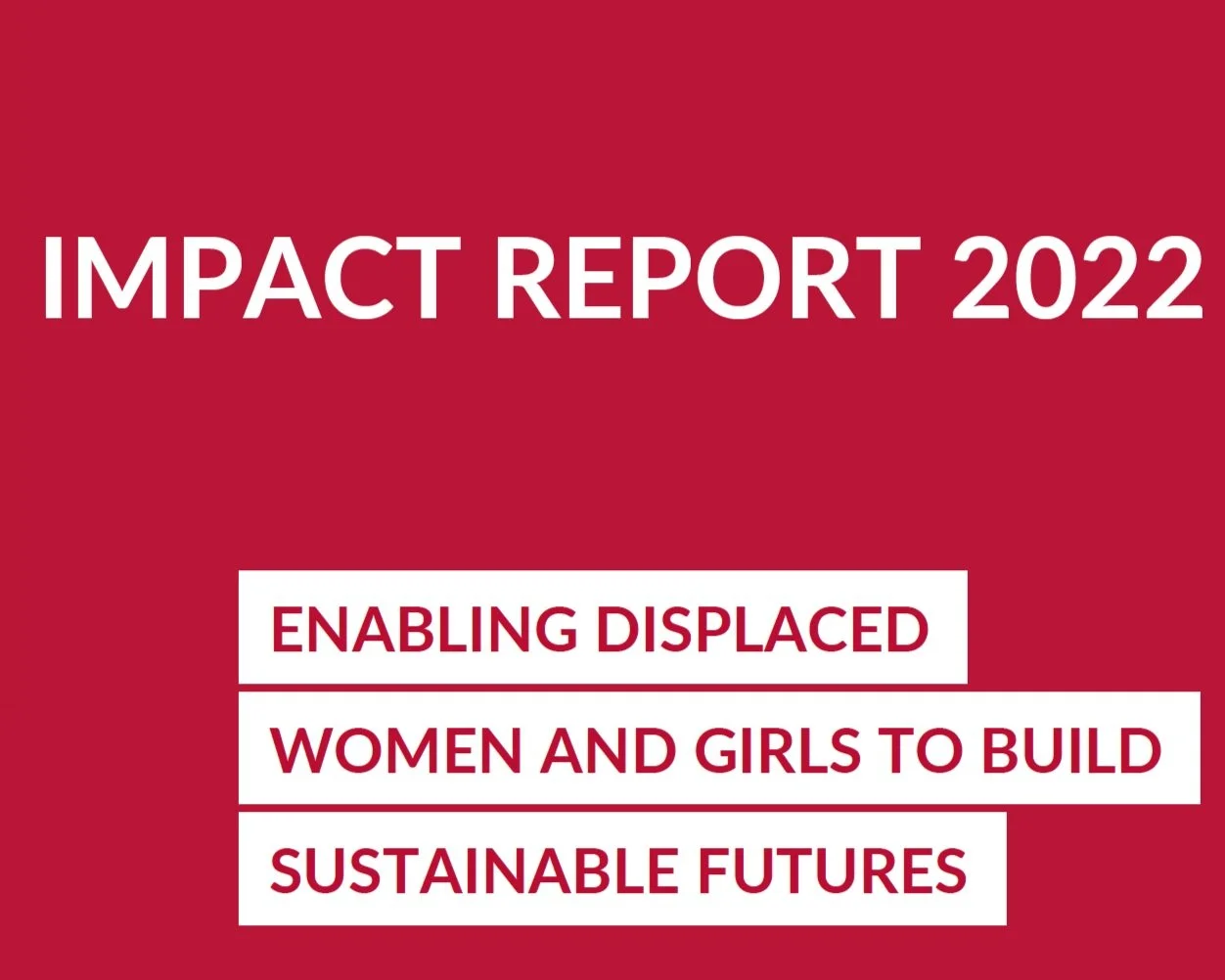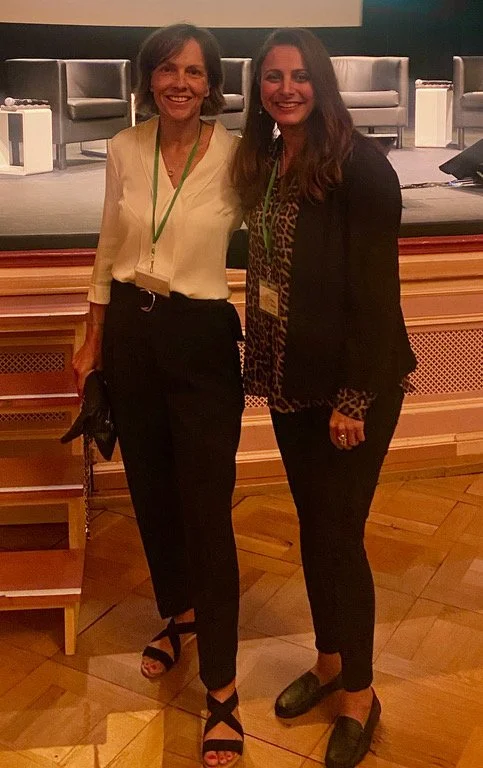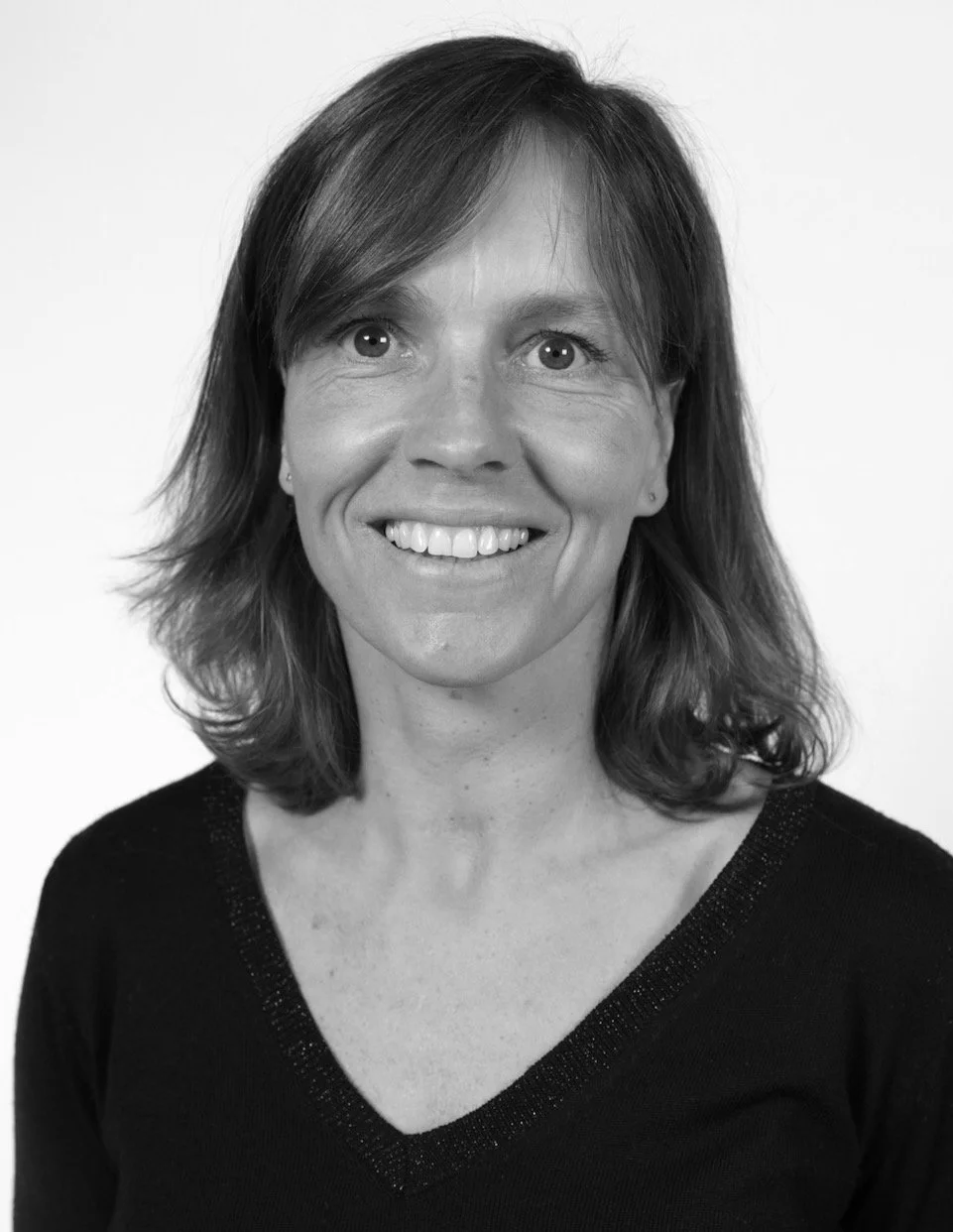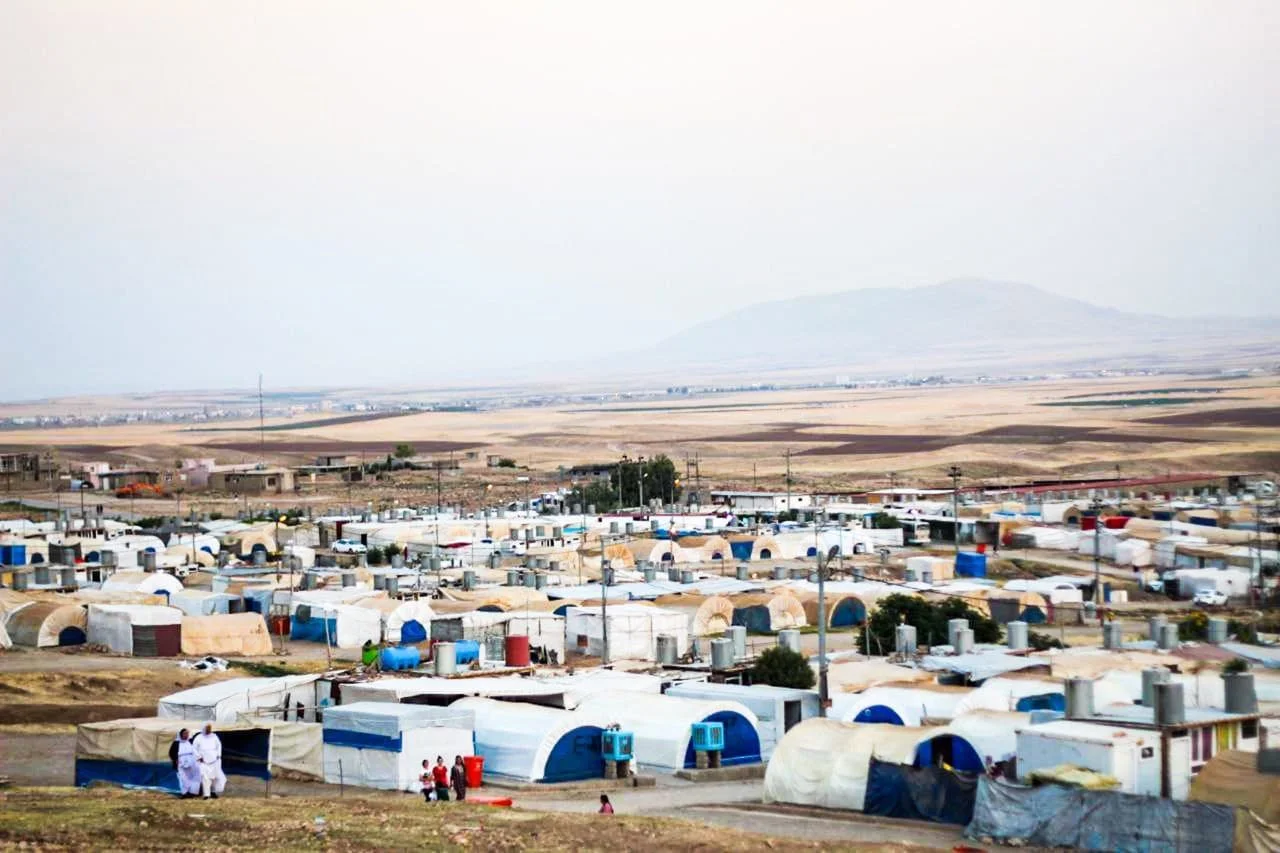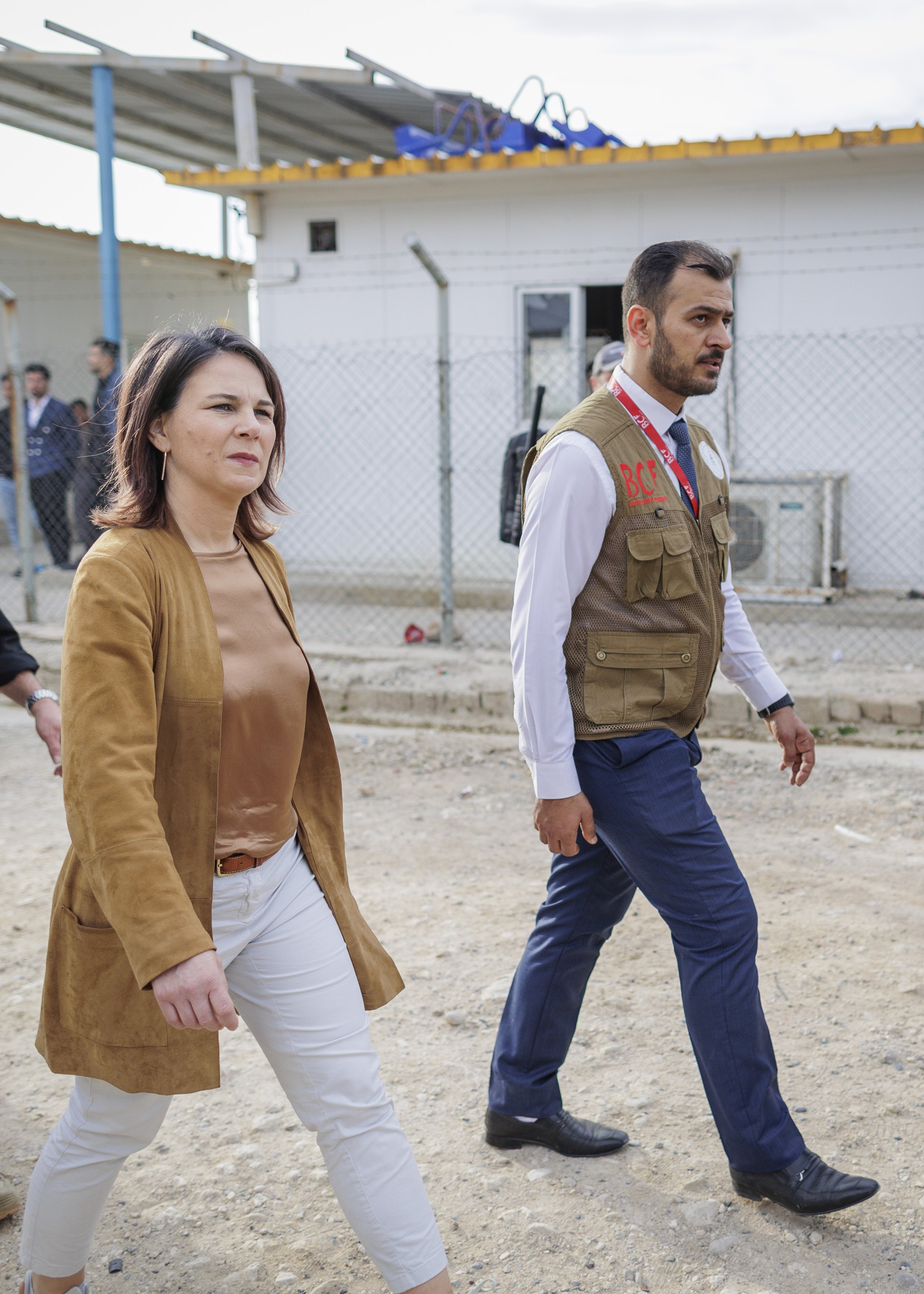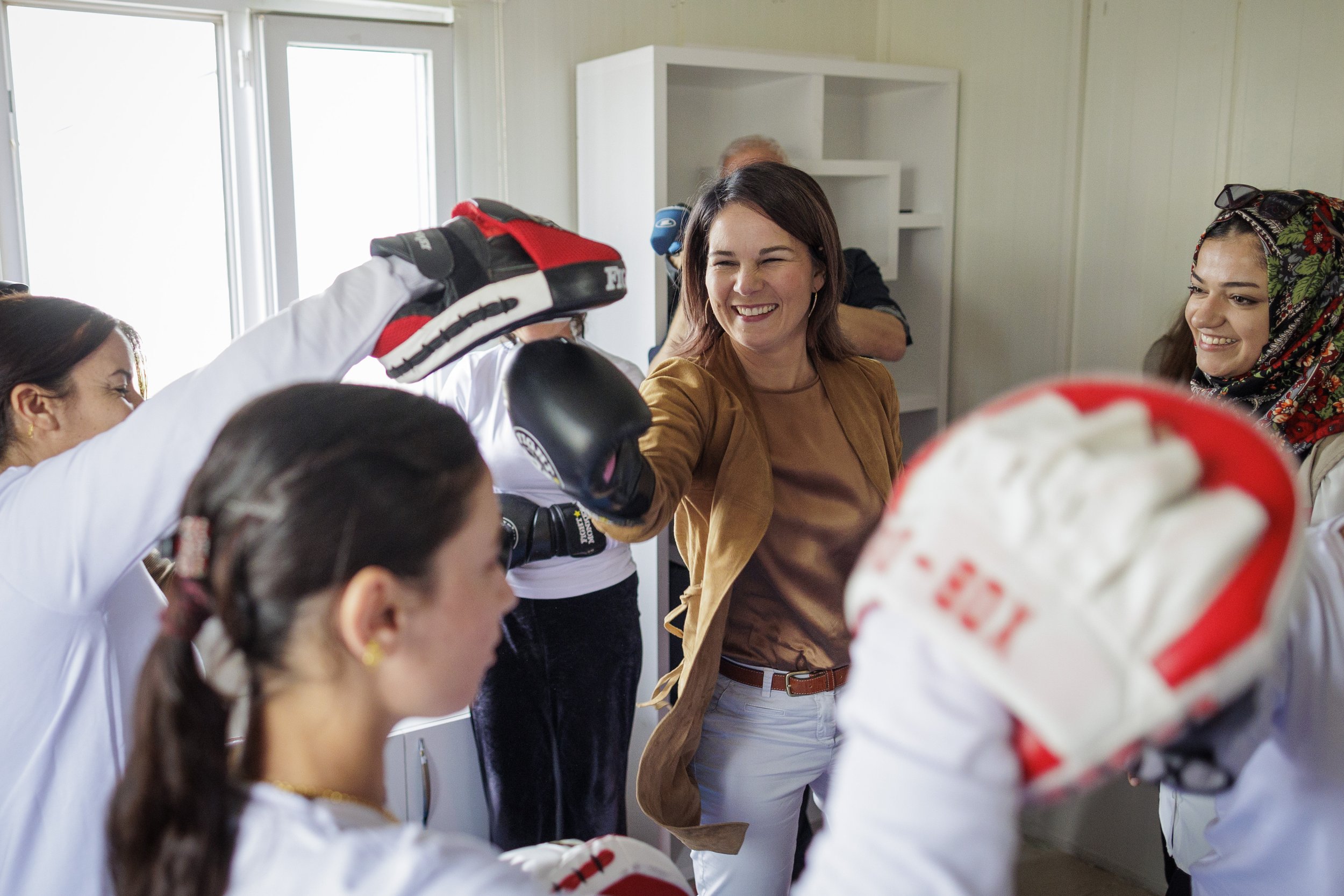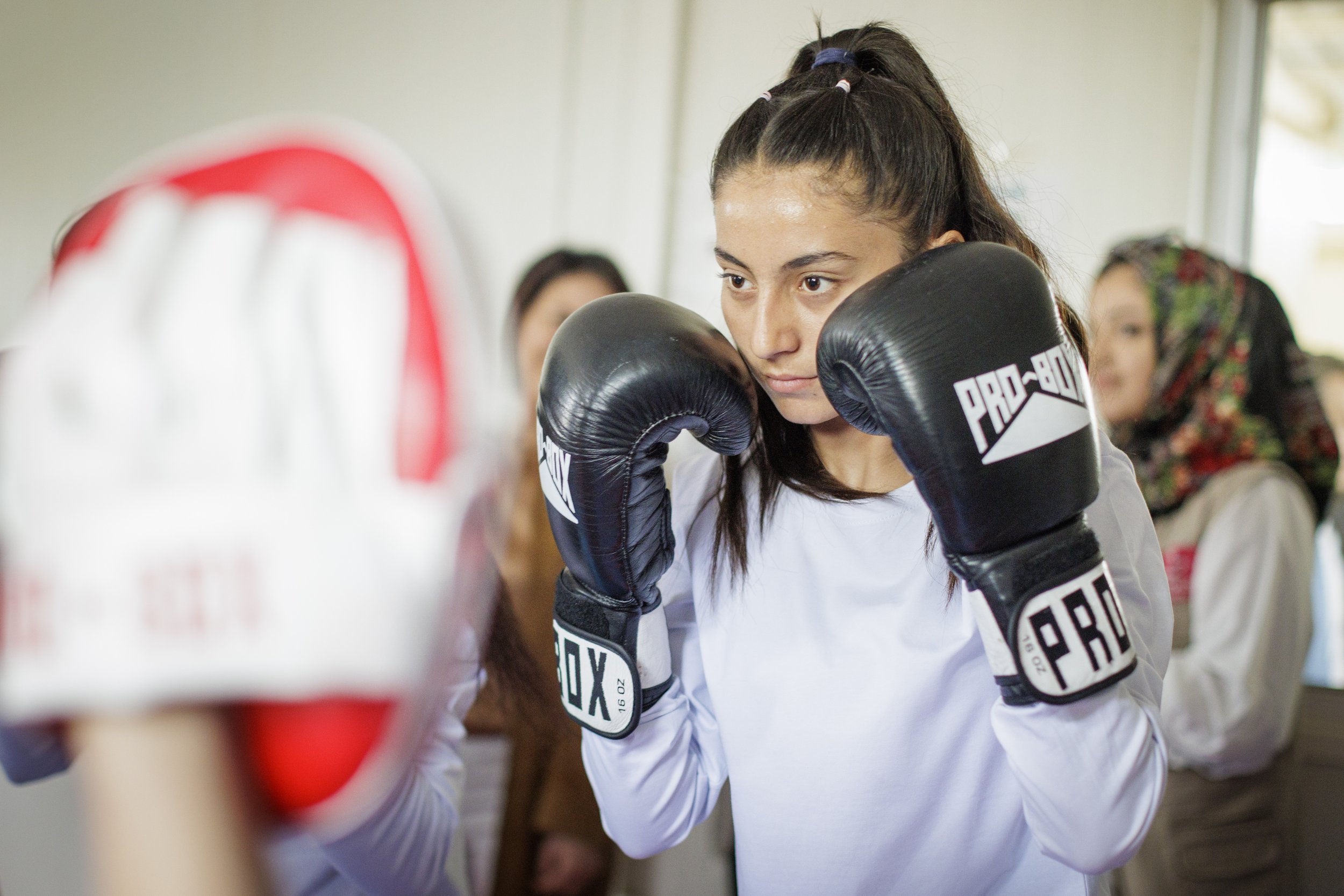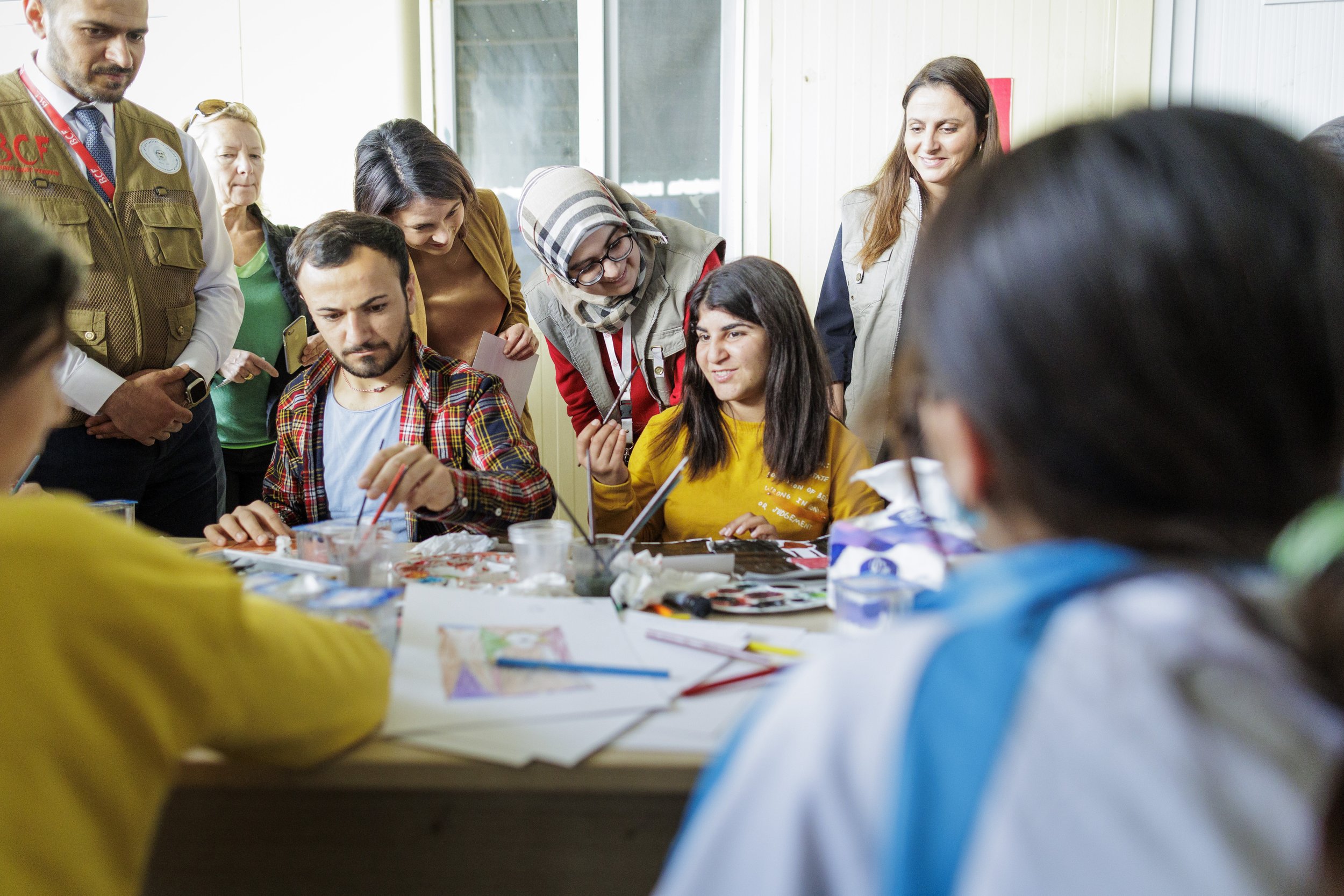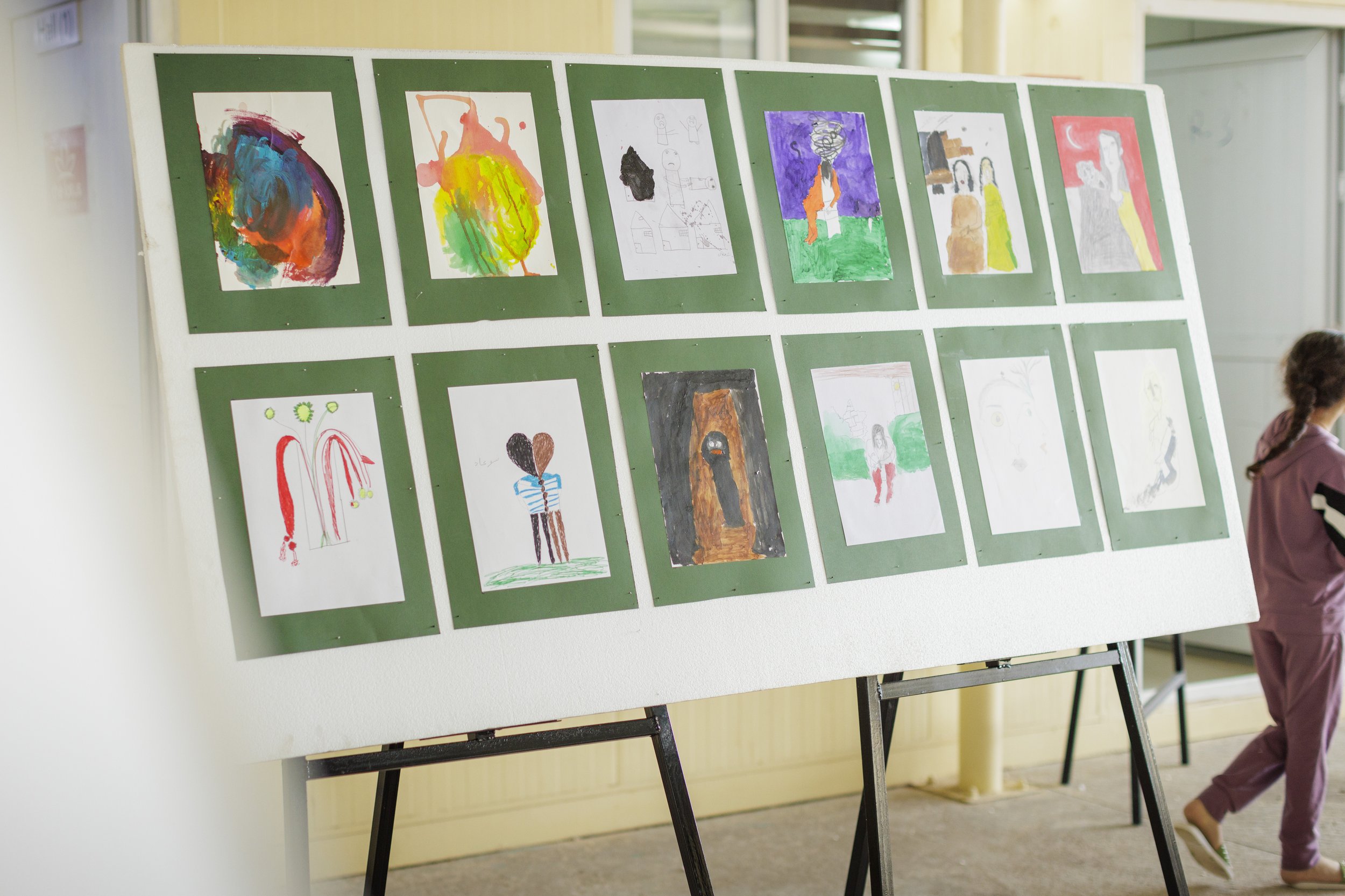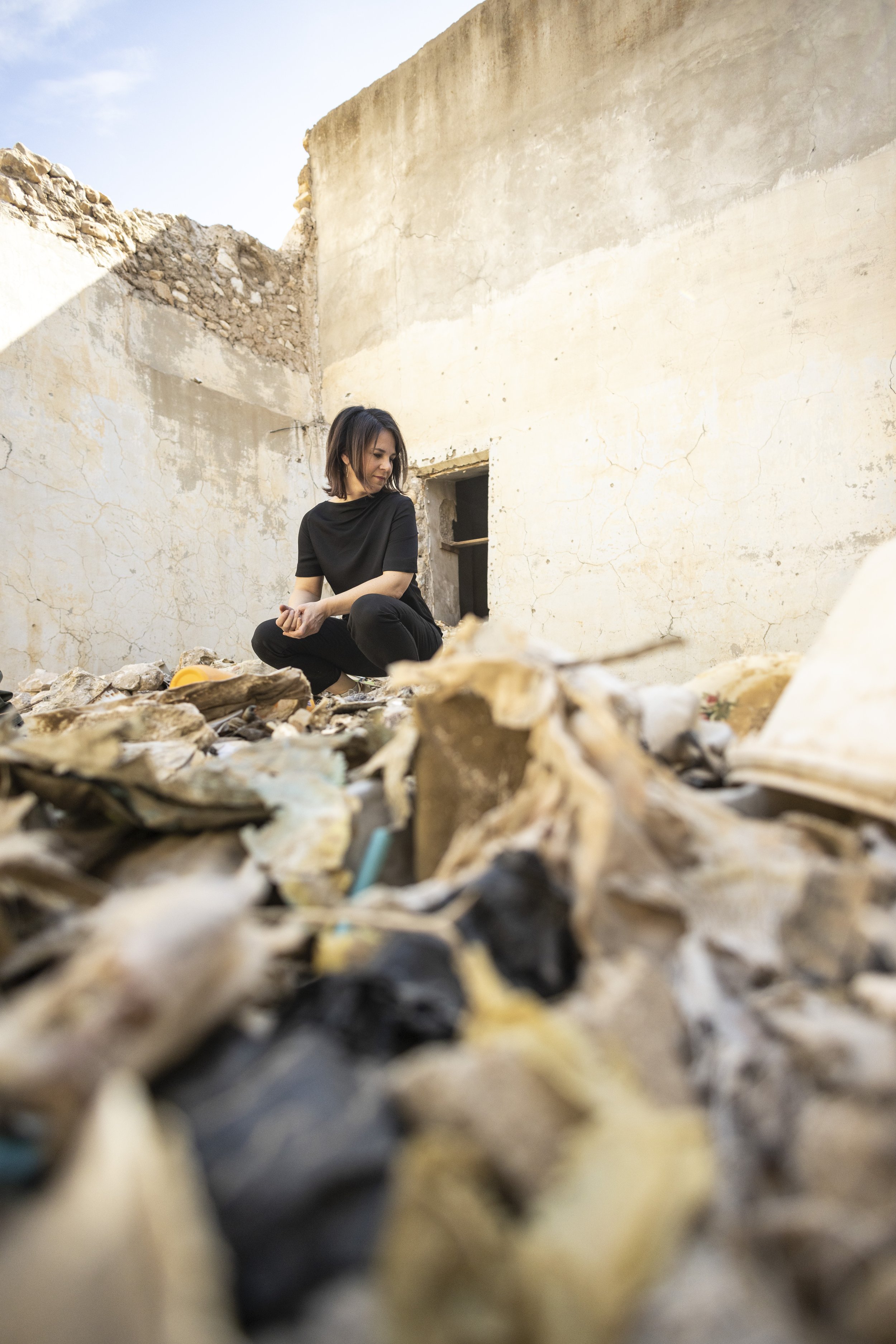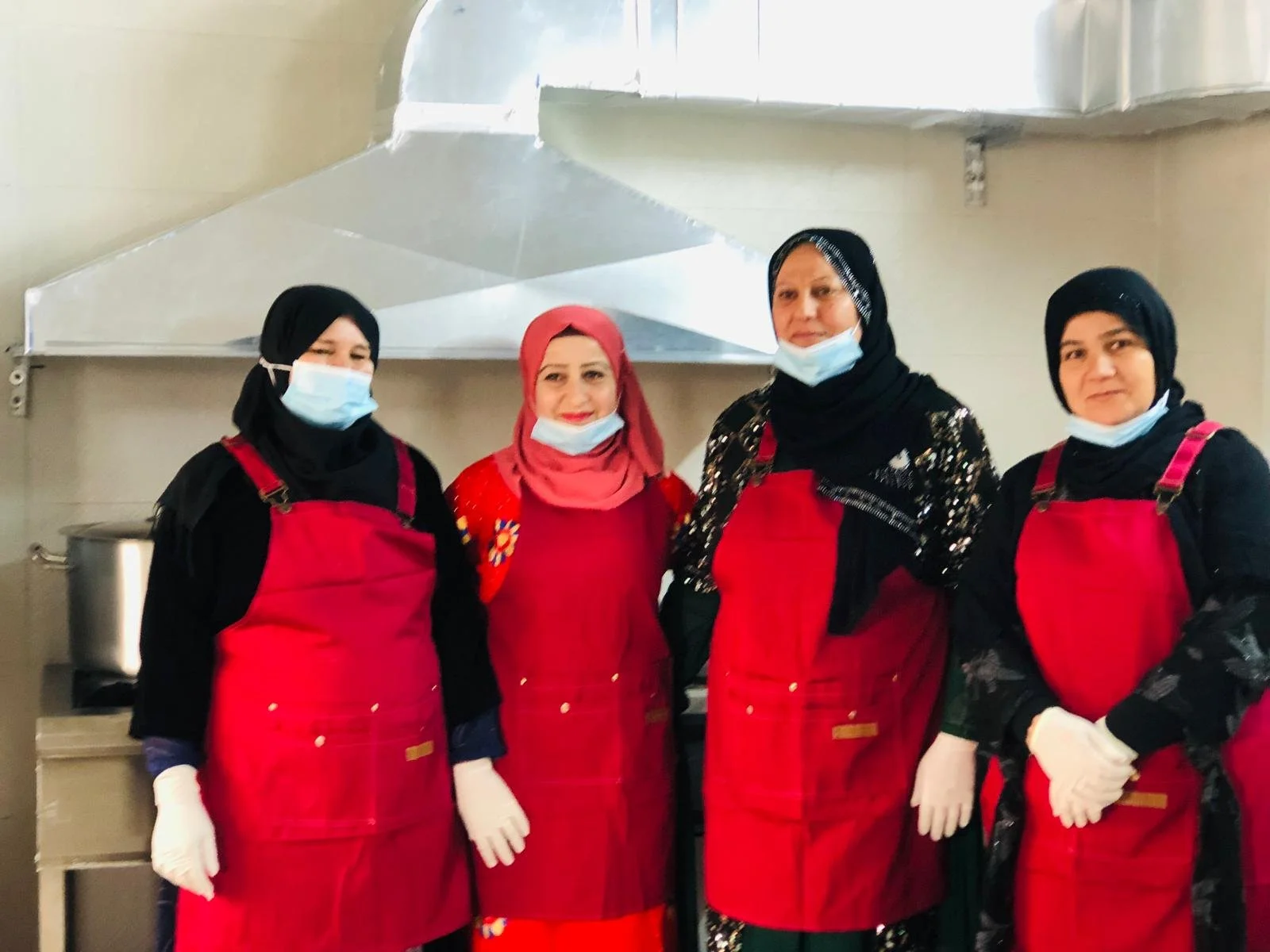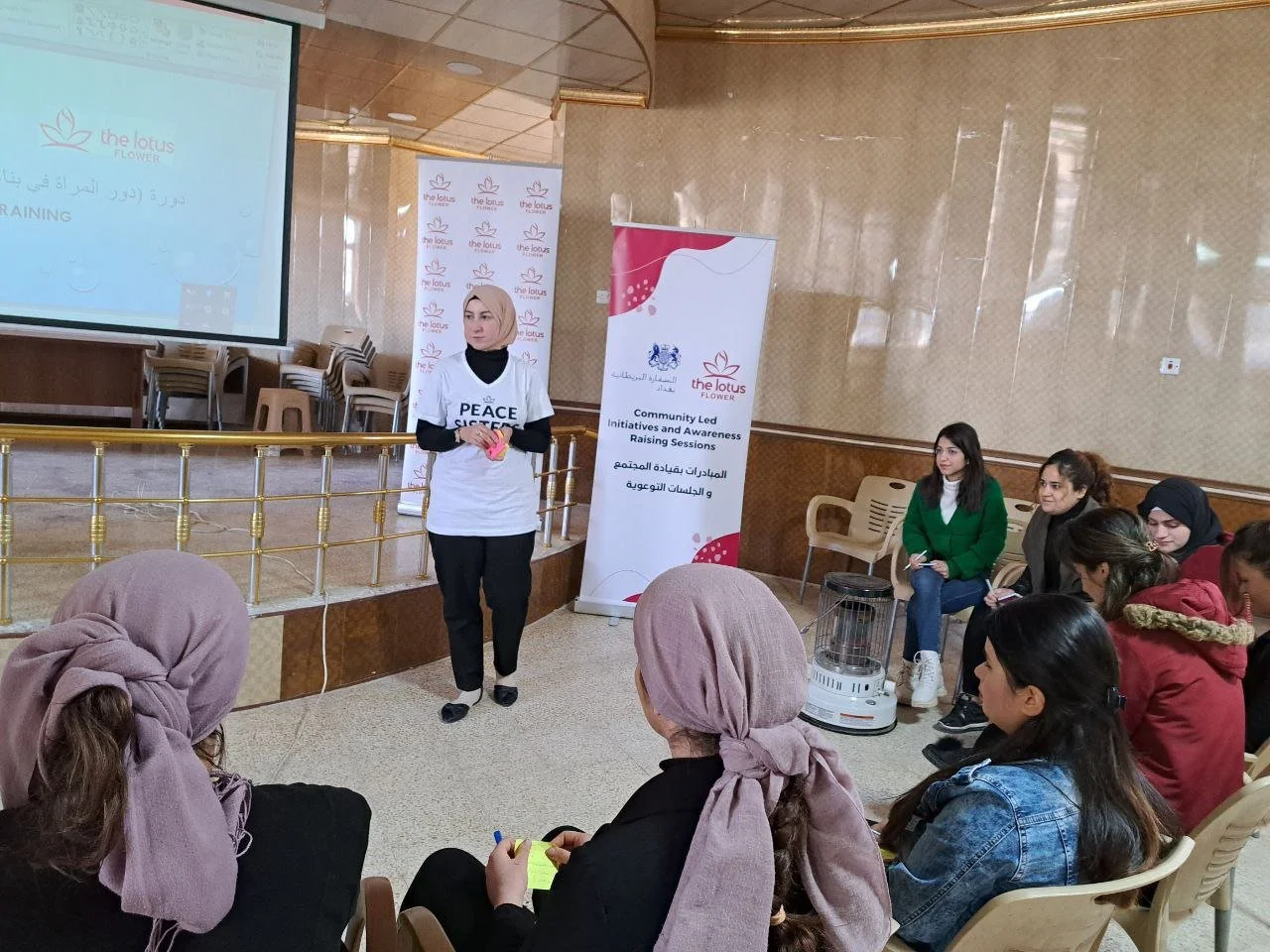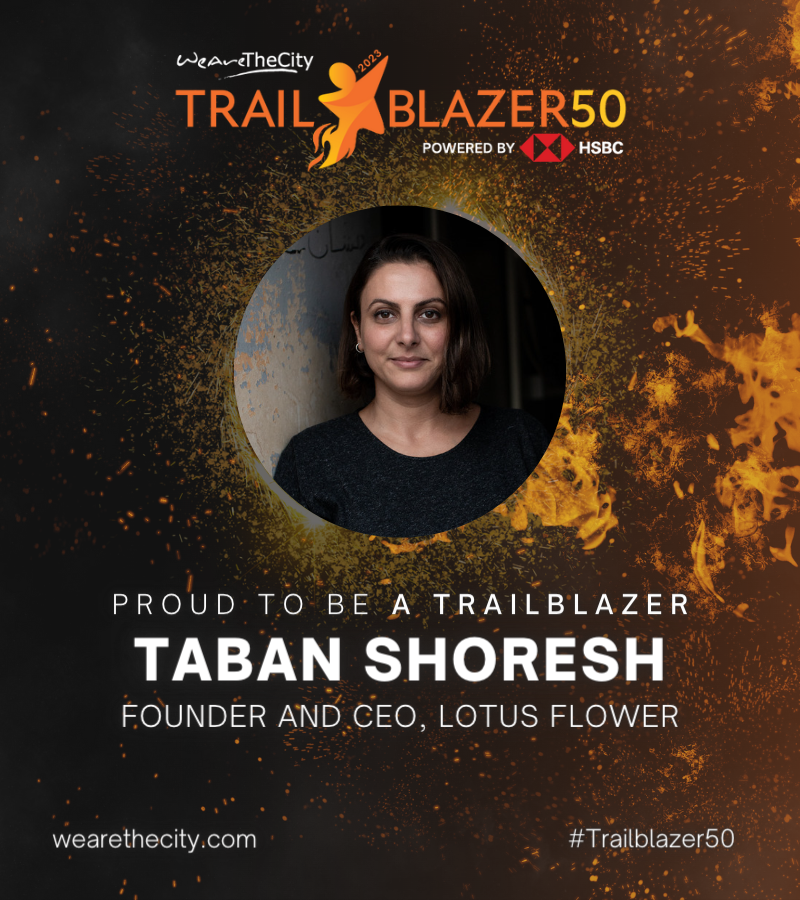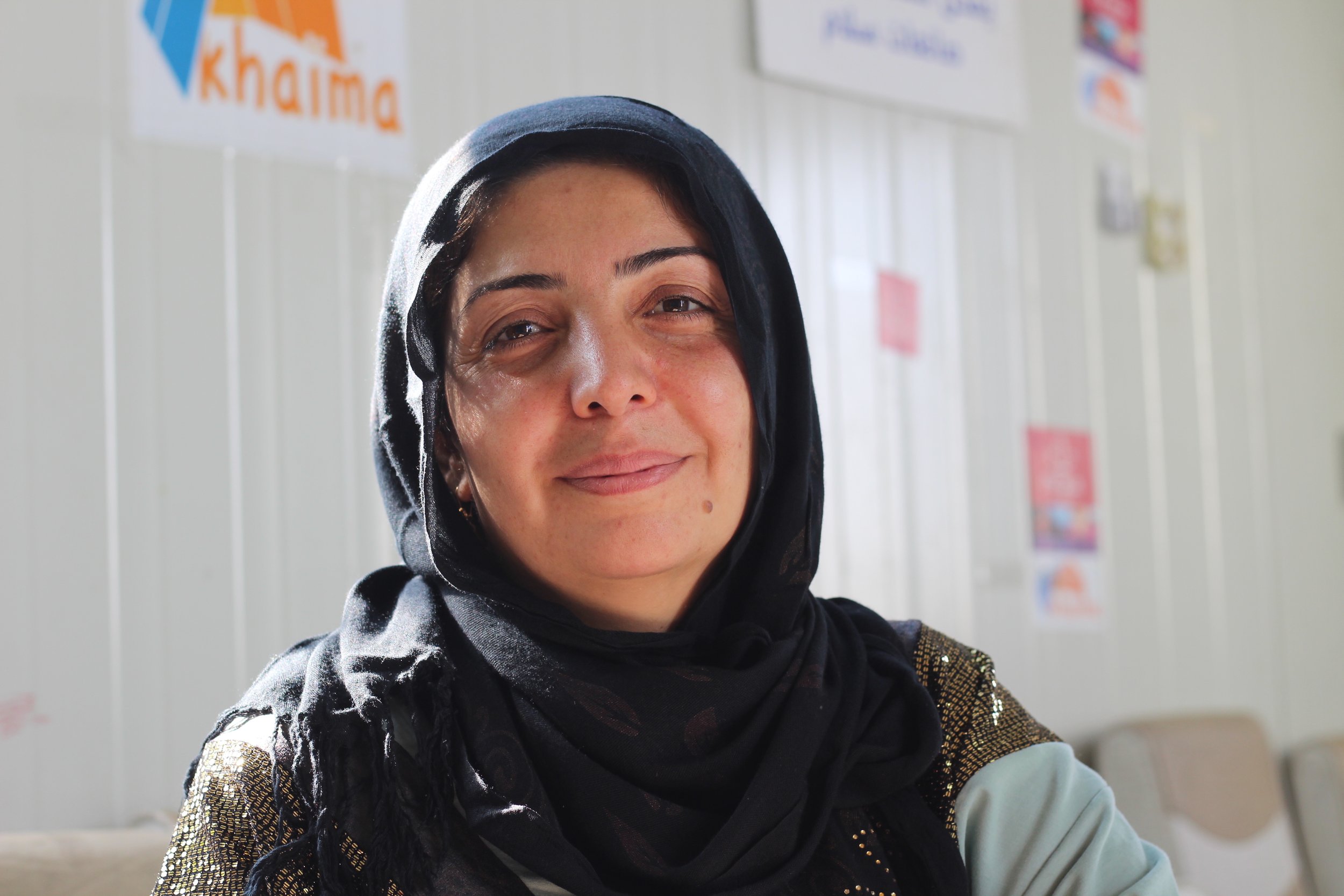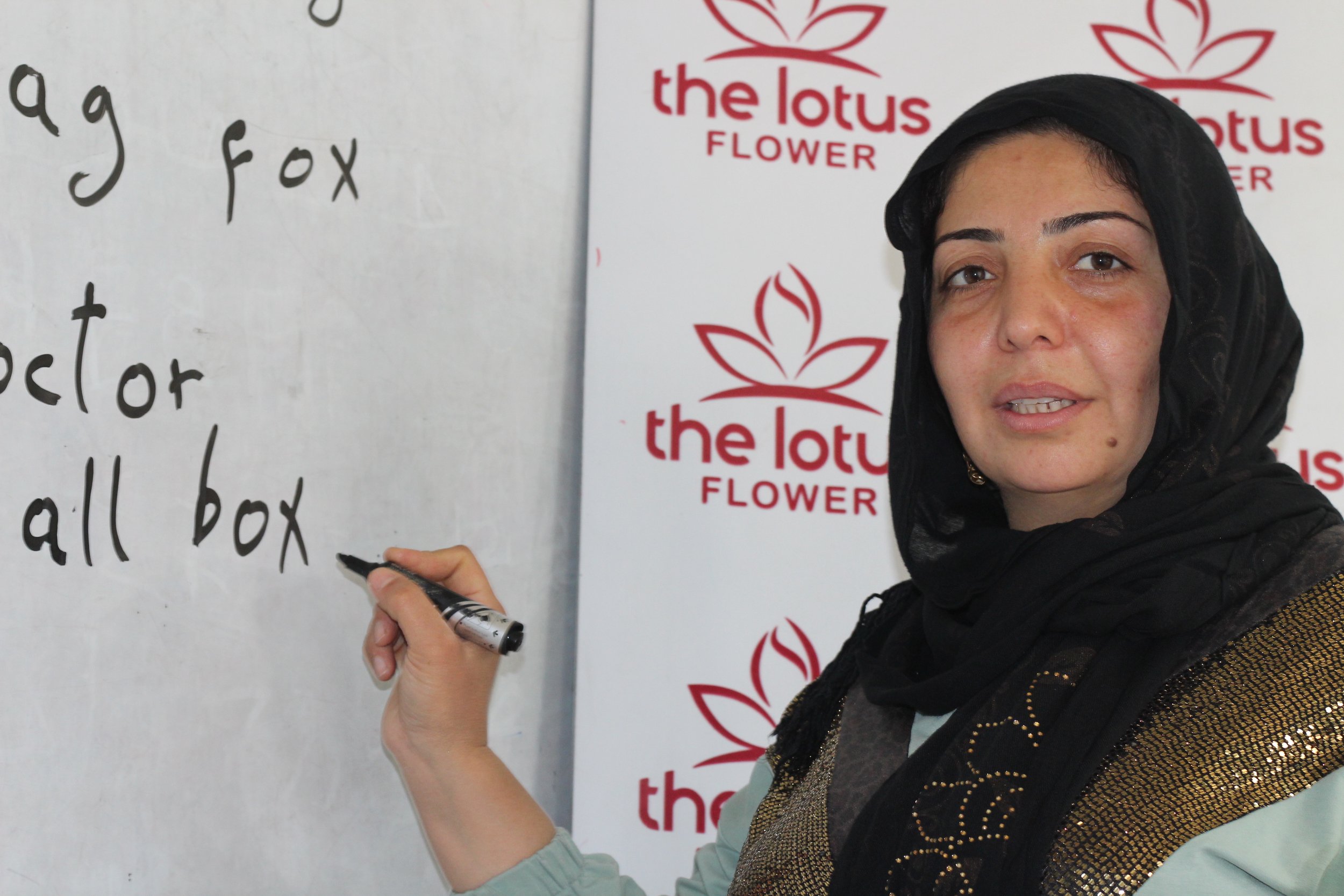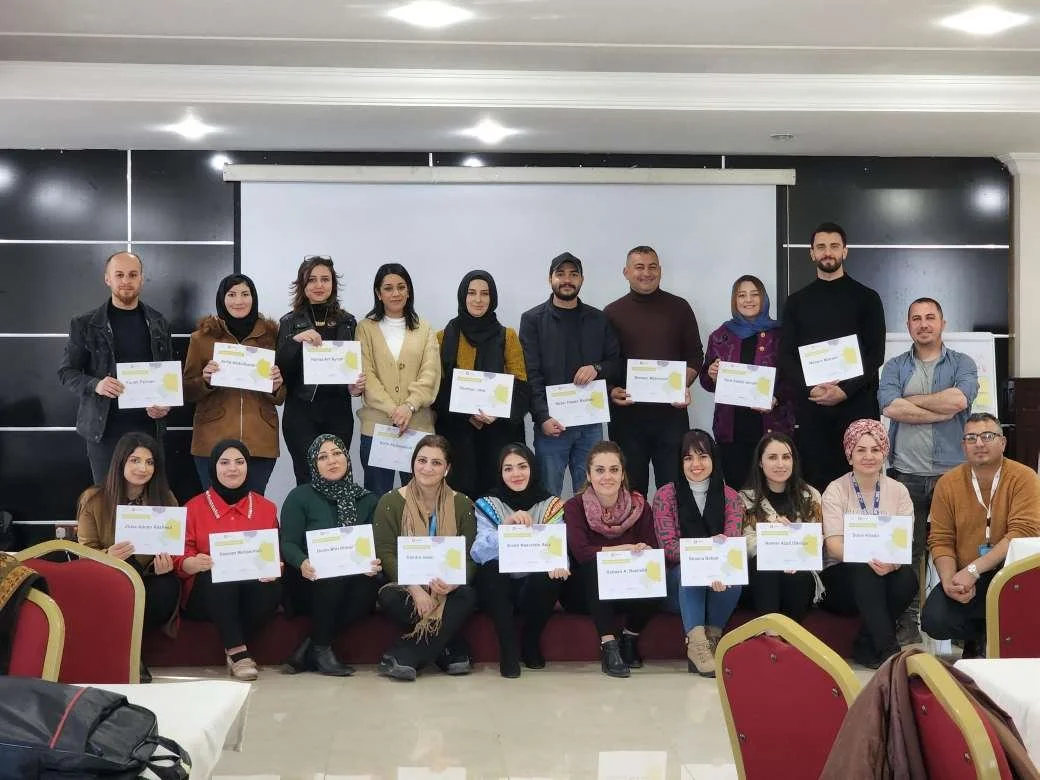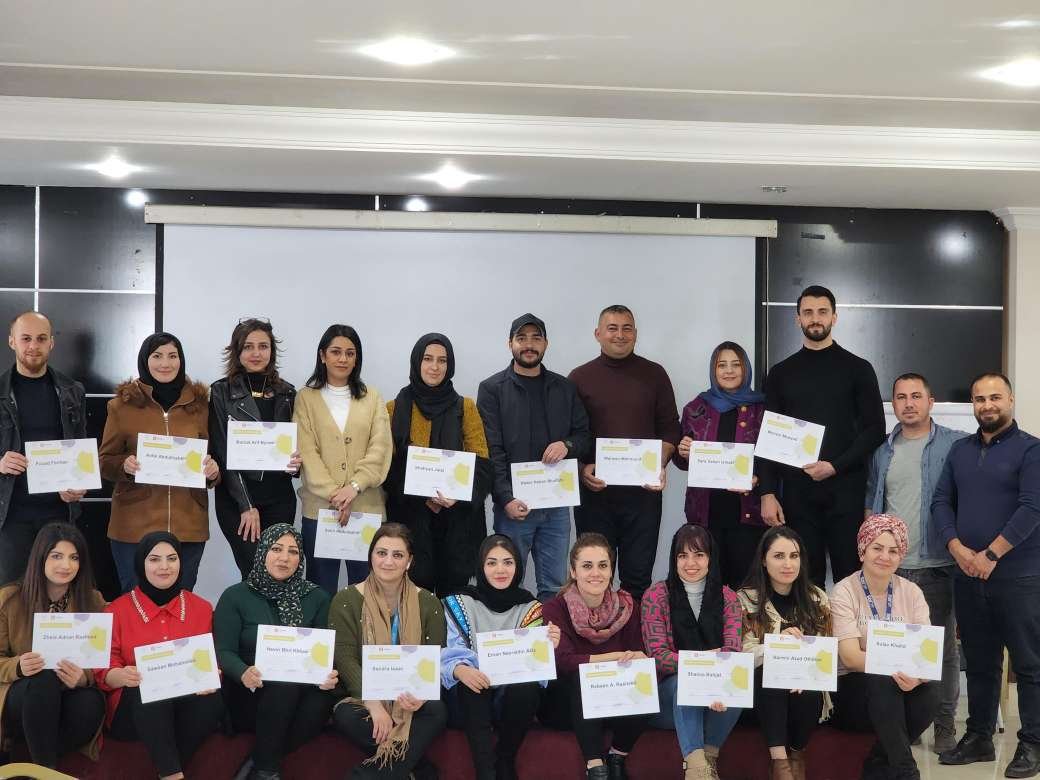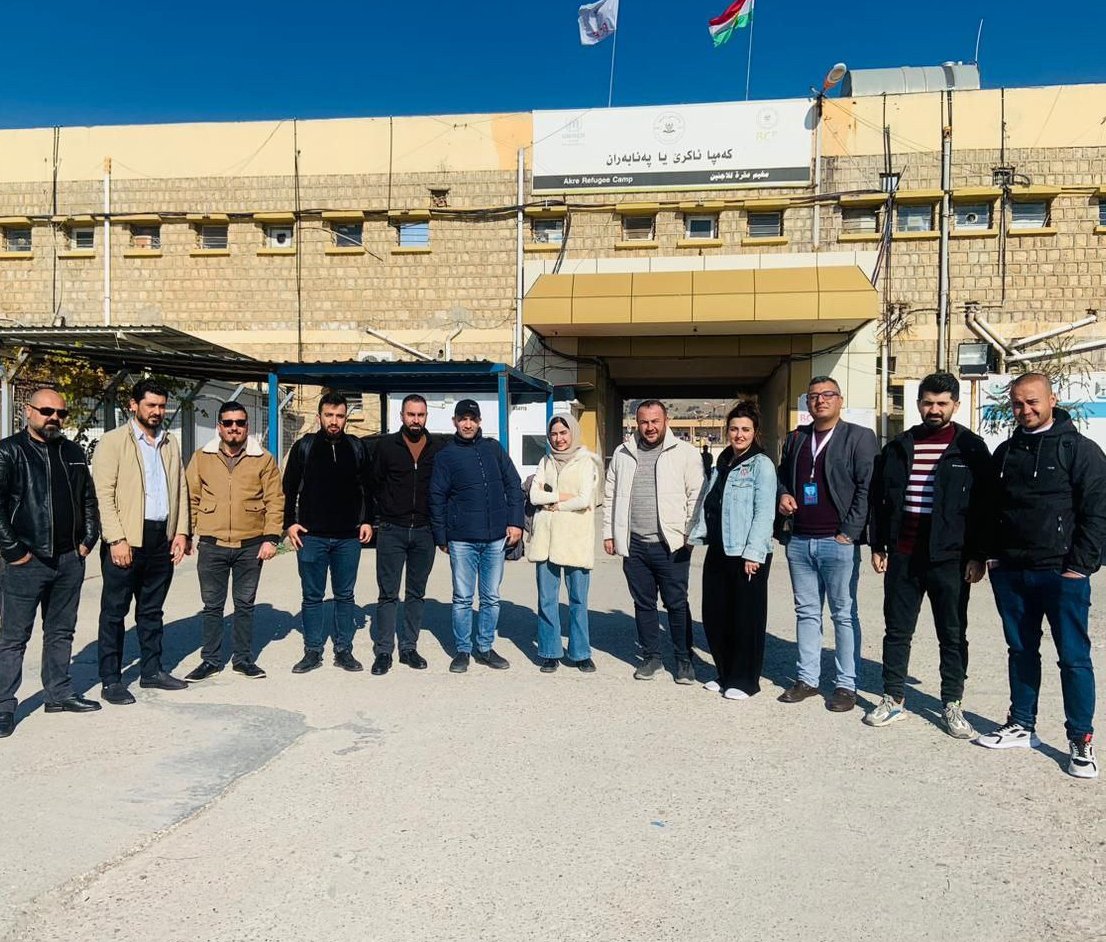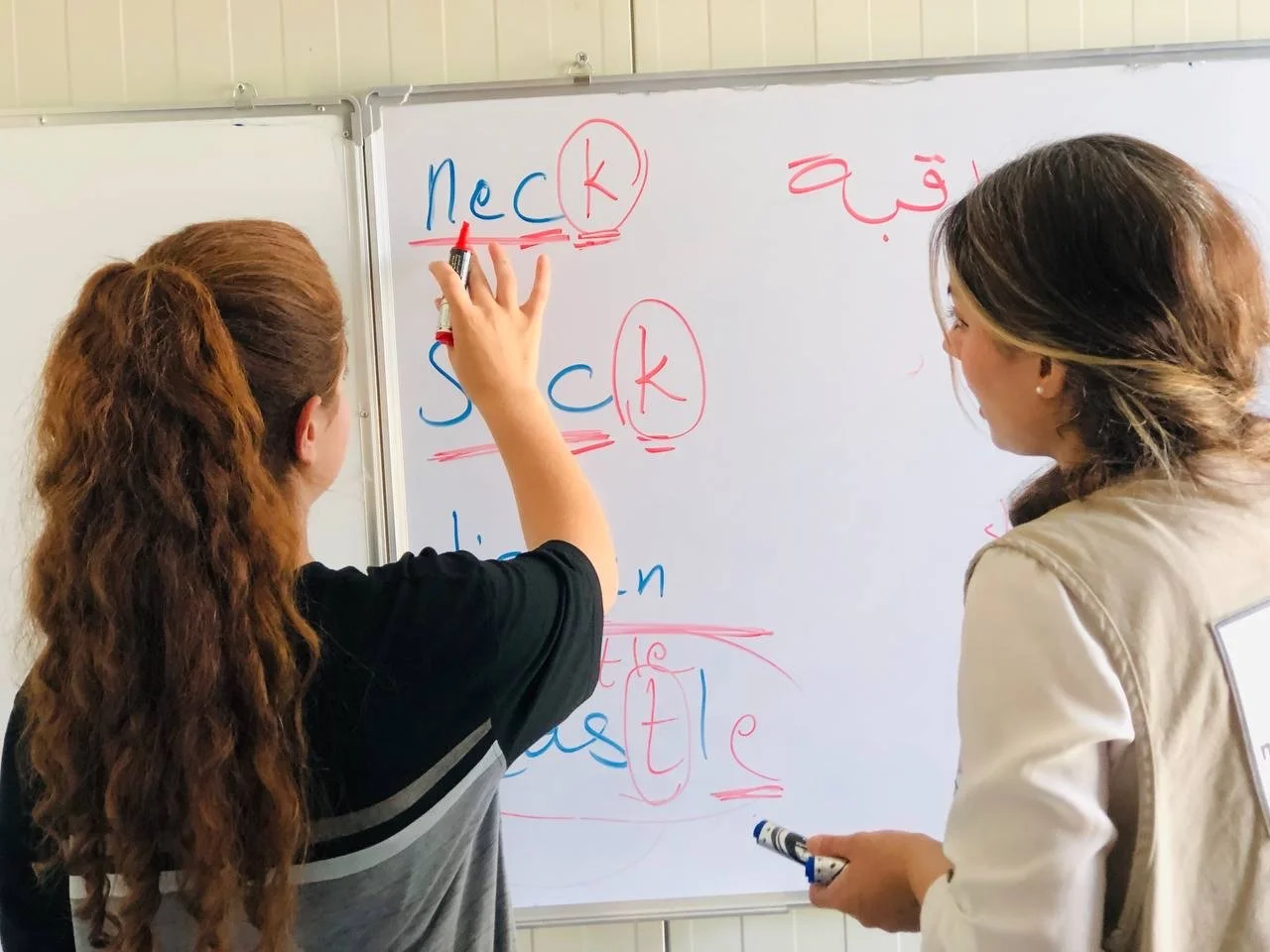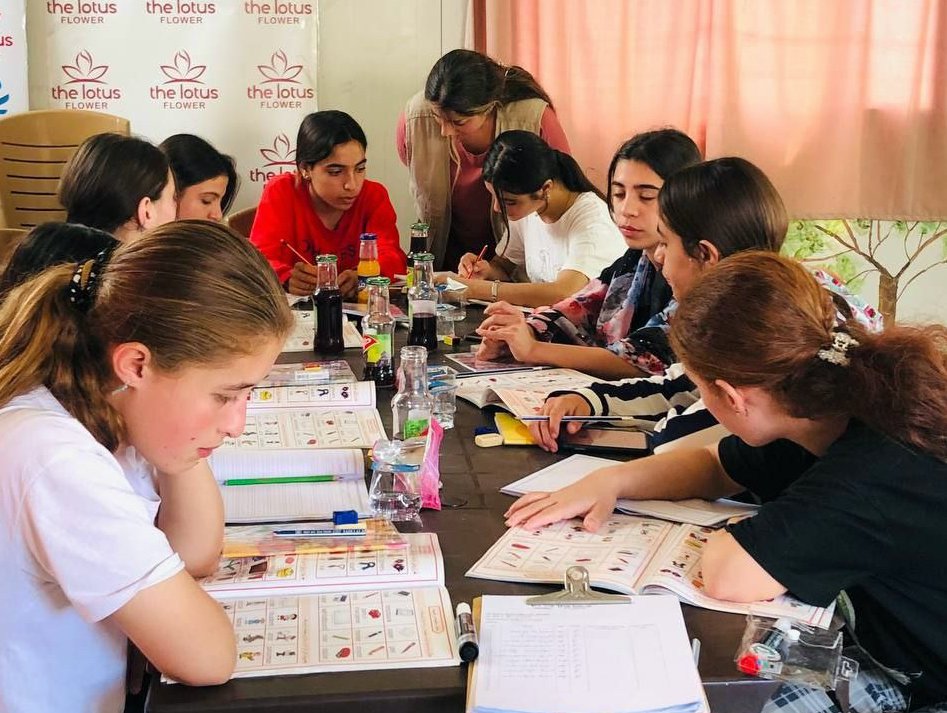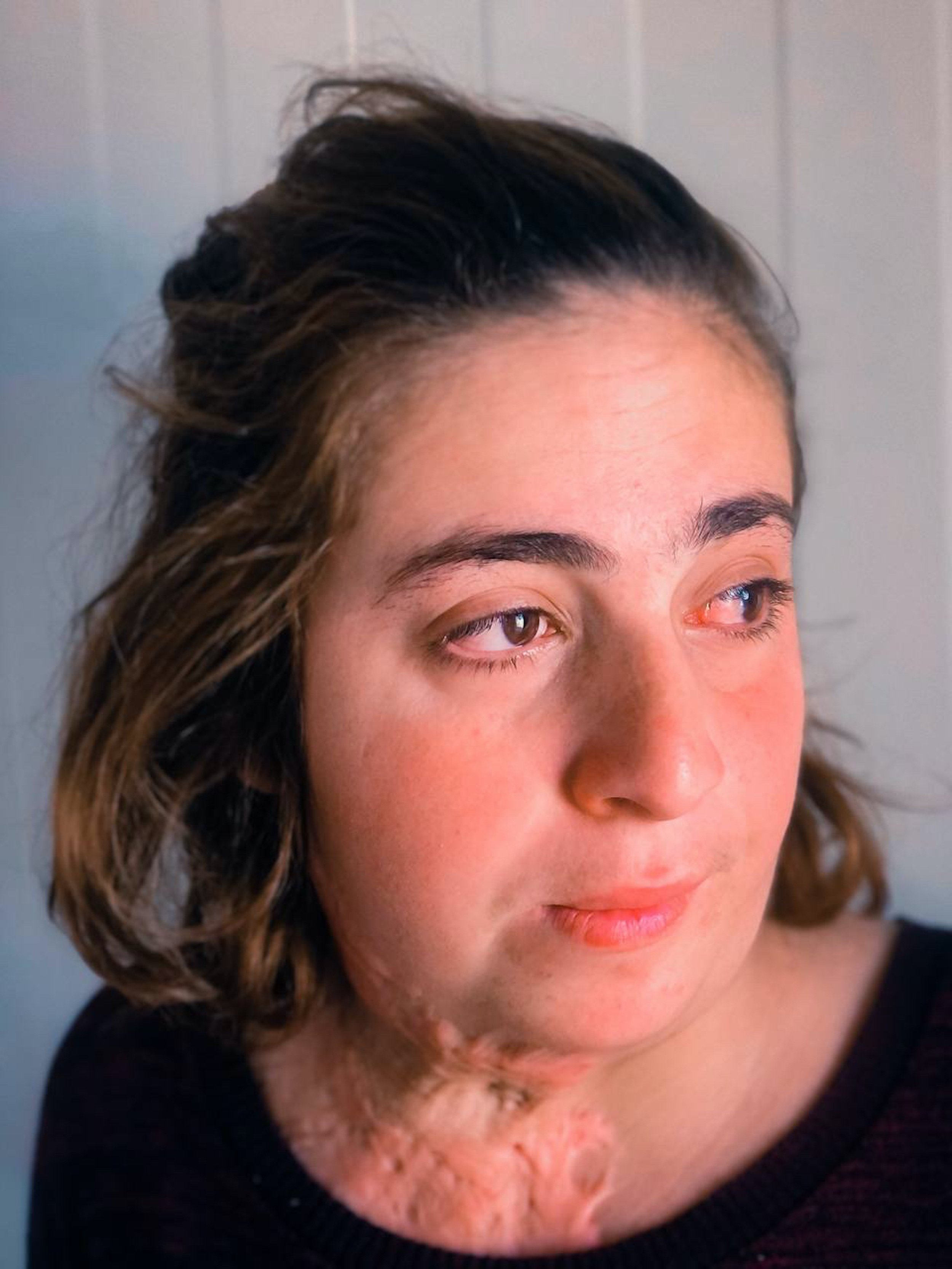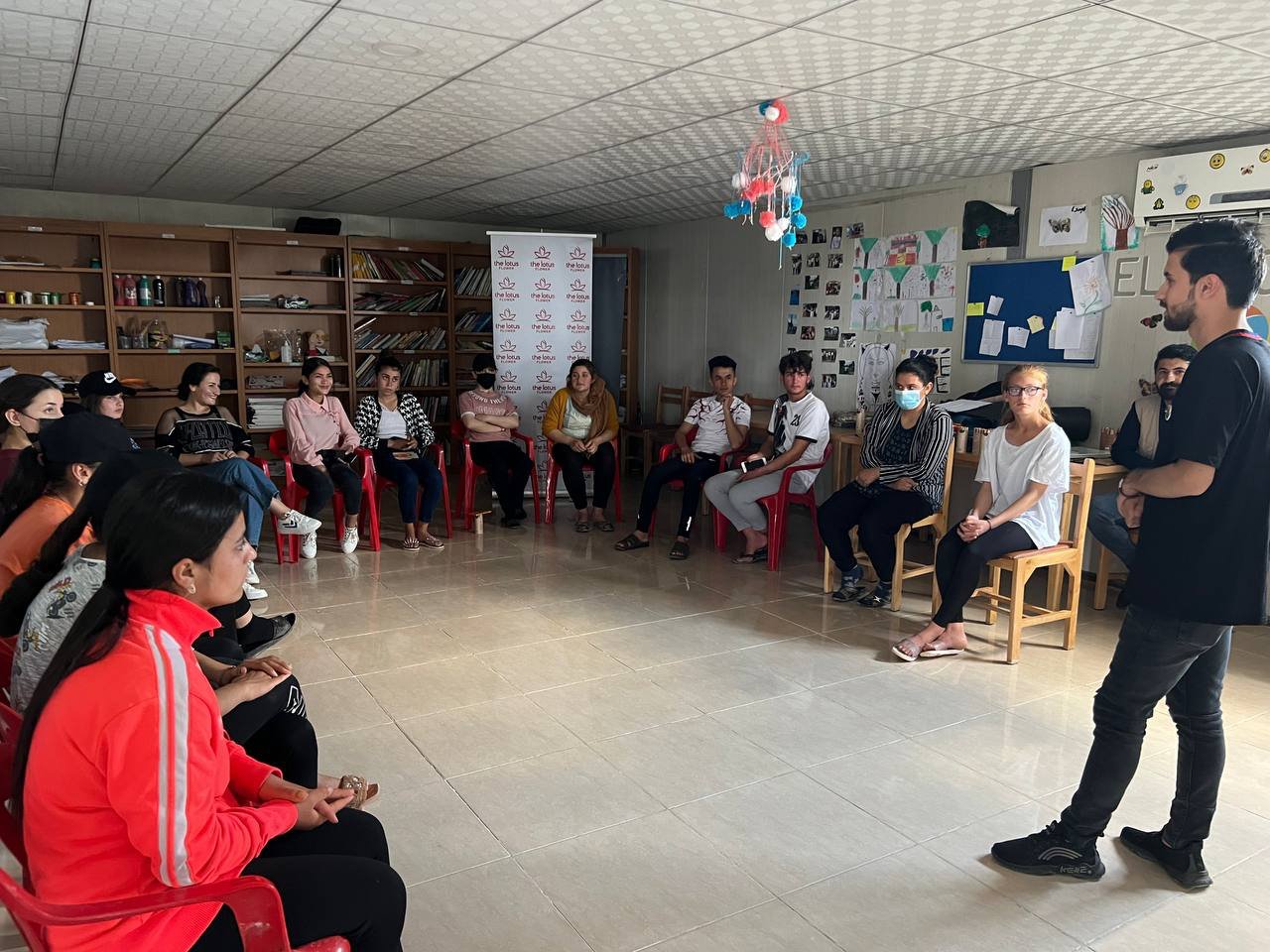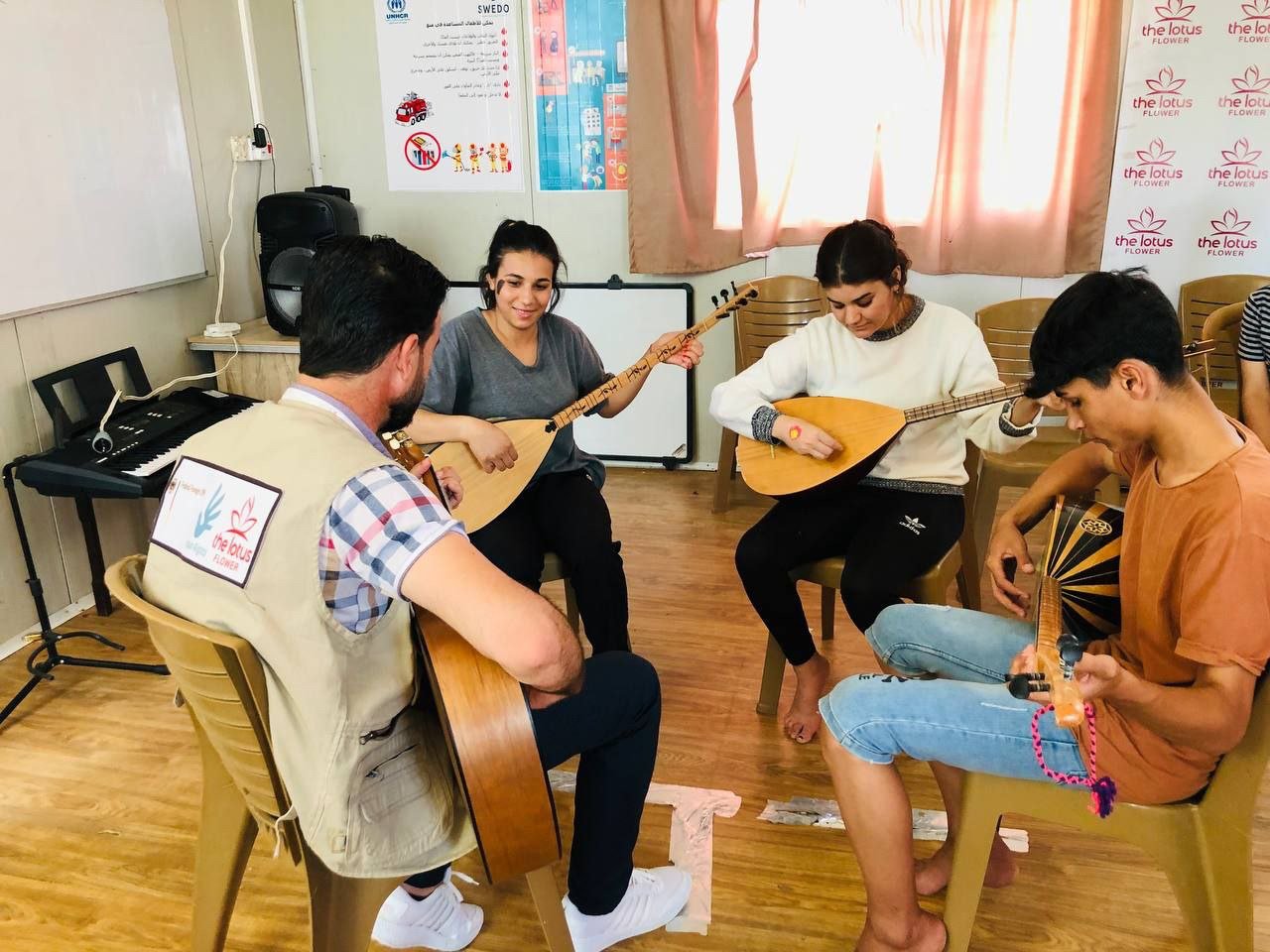Introducing our new Climate Change pillar
The Lotus Flower has some big news to share: we have just launched a fourth project pillar to help tackle the escalating climate crisis in Iraq.
The decision to start our new Climate Change pillar comes after the United Nations Environment Programme (UNEP) named Iraq the fifth most vulnerable country in the world to the effects of the climate emergency – including decreasing availability of food and water water, extreme temperatures and associated health problems.
It’s well known that climate change disproportionately impacts on at-risk communities, with people living in displacement worst-affected by issues such as floods, wildfires, severe droughts, extreme temperatures and restricted access to food and water.
There are also clear links between Iraq’s climate crisis and rising inequality and increased gender-based violence – with women and girls being hardest hit. As UN Women has stated, climate change is a "threat multiplier", which increases social, political and economic tensions in conflict-affected settings, while exposing women and girls to all forms of GBV, as well as trafficking and early marriage.
Under our new project pillar, we will be developing a range of climate-related projects that address crucial issues such as sustainable farming methods and livelihood resilience.
Until now, we have previously had three core pillars: Education & Livelihoods, Health & Safety and Peacebuilding & Human Rights. We believe the adoption of our new Climate Change pillar will support each of these existing areas of our work; for instance through education about environmental risks and health threats, the provision of eco livelihoods initiatives and improved knowledge about climate-related human rights issues.
We have already begun working on the Climate Change pillar, with two projects currently operational. One is our ‘She Leads in Food Security’ initiative, which aims to enhance the food security and economic status of IDPs, refugees and returnees through climate-smart agriculture and income-generating initiatives. A second existing project which launched on International Women's Day is Jam Sisters, which is enabling a group of women refugees to become financially independent through making jams and preserves from local products.
We are now seeking support and funding from individuals and organisations who are as committed to mitigating the adverse effects of climate change as we are. If you would like to get involved or want to hear more, please do drop us a line on info@thelotusflower.org.
You can also read more about the need for our new pillar in this special report we have compiled to support its launch. We hope you find it interesting!
We launch our first Herbal Sisters workshops for women
We are always looking for new ways to provide income-generating opportunities for women and girls, so it was great to welcome acclaimed herbalist Anna Rosa from Iceland recently to run in-camp training workshops.
In groups of 20, Anna Rosa taught the women how to make soothing herbal teas and a nourishing healing balm, using local beeswax and herbs simmered in oil. The long-term idea is that the women will be able to earn sustainable incomes from making and selling similar products in their own communities in future, and Anna Rosa plans to return to Kurdistan to progress Herbal Sisters later this year.
After qualifying as a herbalist more than 30 years ago, Anna Rosa decided she wanted to ‘give back’, so stepped away from her role as a clinician last year to focus on growing her business and philanthropic efforts. “After starting my company 14 years ago, I now produce over 100 products in Iceland – and handpick and make everything myself,” she says.
“The ointment I taught the women to make can be used from head to toe for so many ailments – including wrinkles and fungus feet – and it’s better for them than very cheap creams which usually contain a lot of toxic ingredients. By teaching them these skills, we could help avoid a lot of problems with plastics and toxicity in future.”
While in Kurdistan, she tracked down beeswax from a local beekeeper and discovered plentiful herbs in the local markets, including chamomile and stinging nettles. “I also found things like turmeric, ginger and peppermint, which are all common and available everywhere – but are powerful medicinal herbs. They’re also highly affordable which is essential for the women.”
Anna Rosa is now working on developing other types of herbal workshops to take back with her. “The women were telling me they’re in physical pain, with things like arthritis, muscle tension and diabetes as well as insomnia. Traditionally they don't have much to help with these things. I also do a lot on the mental health side, which is a real issue for them after the trauma they’ve been through. They thought many of these problems were unique to them, but of course lots of people are struggling in the same way. Herbs are very helpful for things like anxiety and depression.”
Speaking of her experience of running the workshops in March, Anna Rosa adds: “I feel at home when I'm teaching, and the women were so welcoming and enthusiastic. We laughed a lot and had good fun, which is an essential part of it. If you can connect like that, we can figure everything else out – that's how I look at it.”
Anna Rosa is now looking to secure funding so she can return to the region and make Herbal Sisters a more permanent part of our programming. “I want to be able to finance this myself and love the idea of it being sustainable, but of course I need to raise money to support it,” she says. If you can support her or want to hear more, please do email Anna Rosa on care@annarosaskincare.com.
Check out our new impact report for 2022
Our new impact report has been unveiled - and we're all so proud of what we've achieved.
The report includes our latest beneficiary numbers, as well as the total number of people we’ve reached through our work since we first launched in March 2016.
It also shares information about our recent projects, plus case studies and details on how we work.
Every organisation’s impact report is essential not only for transparency, but also to show donors and supporters how such help is enabling us to keep growing and reaching more vulnerable women, girls and community members.
We hope you'll find the report interesting - please do share with your networks if so, as we really want to build on this growth over the course of this year!
Donor Q&A: 'The Lotus Flower ticks all the boxes'
Sophie Pelka is Co-Founder of the Give It Forward Trust, a key donor for the Lotus Flower and one of our most loyal supporters. GIFT works by encouraging individuals to make meaningful funding commitments that sustainably transform the lives of the disadvantaged. Here, we chat to Sophie to find out about her vision of more effective philanthropy, and why she so firmly believes in our work…
Firstly Sophie, what’s your career background?
“I worked in London for 10 years in investment banking, leverage finance and private equity. I really enjoyed my job, and learned about successful business models, in depth analysis of private companies, due diligence processes, and complex transactions. I was able to acquire a broad range of competences that are serving me today in making our philanthropy more impactful.”
How did you move into philanthropy?
“We live in a small town in the Swiss mountains and while focusing on motherhood, I got involved with volunteering at the school and the local ski club. I started giving back, and it felt good. Travel was also a big thing for our family, and though I’d planned to return to finance, something changed during a round-the-world trip we took. I realised I didn’t get to where I was because of always making great decisions, but because I’d been lucky from day one. That realisation made me want to do more in philanthropy – but do it better.”
So that’s how GIFT came to be?
“Yes. I began taking online philanthropy courses, and saw it was exactly the job I was doing before, but in an industry that spoke to me more. So my husband, myself and a friend created GIFT in 2020. The idea was twofold: to make philanthropy more impactful and strategic, and to try and convince other lucky individuals to join the journey. We knew we needed more people alongside us to have more leverage. Launching during the pandemic gave us a sense of urgency and purpose, and it was a time where I thought, ‘It's now that people really need help. Let's go’.”
Sophie with our Founder and CEO Taban
What makes GIFT different?
“The main thing is that we believe in two principles: long-term and unrestricted funding. Unrestricted funding sets us apart, because so many donors only offer project-linked funding. We don't want to intervene with the decisions an organisation is making because they know how to help people, not us. So once we've done our due diligence, we trust the organisation to get on with it. When people question unrestricted funding, I always say that we’d never expect a company like Apple to run without admin, strategy or marketing, so how can we expect to attract good people if those things aren’t supported?”
What do you look for in those you support?
“We want relationships that are based on trust and transparency. Those principles are close to my heart. Finding an organisation is easy, but choosing one and doing the due diligence is different. We apply the same criteria that we would in any private deal, so we focus on operations and ask: is the organisation efficient, is it achieving its goals and is it sustainable? We also look at governance, and whether it’s led by a capable and ethical management team. And we look at impact. The Lotus Flower ticks all those boxes.”
You often use the word ‘lucky.’ What do you mean by that?
“I tell people that lots of us are very lucky and it's quite easy to give back. It won't change your own life if you give 10% of your income, but it will be life-changing for those who are disadvantaged. We want to create more awareness of that and give those who were not born in the right time or place a chance. We should all be equal.”
“The Lotus Flower has shown it can collaborate with major organisations”
How many organisations are you supporting?
“We've got a portfolio of five, and are on-boarding a sixth. I'm keen for us to stay fairly small because it's nice to help organisations like the Lotus Flower who are at a critical stage of development, and it means we can take time to get to know them. Money is one aspect of philanthropy, but so is capacity-building and help with fundraising. There are many things we can bring to the table, but to do that requires time and focusing on a select number of high quality organisations.”
What attracts you to the Lotus Flower?
“We are a perfect match, because a big focus for us is women and girls, and our pillars are very similar too. We also look for organisations where beneficiaries are at the centre, and where solutions are locally led and implemented. The Lotus Flower is doing that in an incredible way. Taban (Shoresh) is also a strong leader who has gone through similar experiences and knows how to help people. The ability to collaborate is important when faced with so many complex problems too, and the Lotus Flower has shown it can collaborate with major organisations – such as UNHCR and CARE.”
You mentioned the importance of impact…
“Yes, people who give money want to feel good about what they give, and one of the ways we do that is to focus on impact. But we try not to impose ourselves on that, as impact measurement should not be achieved just to please a donor. It needs to be developed by the organisation to enable them to grow and improve their programs. Beneficiary feedback is a key component of that process. Women in the community know exactly how to help themselves. They have a voice, they just need to be empowered to use it and we need to listen. And once they’ve been helped, they want to give back too – that’s the ‘give it forward’ magic.”
Can you support us?
German Minister Annalena Baerbock visits our projects
One of the highlights of International Women’s Day for us this year was a special visit from German foreign minister Annalena Baerbock, who came to experience some of our projects firsthand.
During a four-day trip to Iraq, Annalena made time in her hectic schedule to meet with us and many of the women and girls we support at Rwanga camp (Qadiya).
Image credit: photothek.de
While touring the camp, she checked out our Boxing Sisters programme, even pulling on a pair of gloves and sparring with some of the girls. Annalena also visited our Baking Sisters project, where she chatted to some of the participants and sampled their bakes. And she dropped into one of our music therapy sessions and an art class too, paying close attention to a gallery of work by the aspiring young artists.
Image credit: photothek.de
Image credit: photothek.de
Image credit: photothek.de
Image credit: photothek.de
Our staff, including Founder and CEO Taban and Regional Director Vian, greatly enjoyed talking to Annalena, whose vision of ‘feminist foreign policy’ focuses on ways in which diplomacy can better represent women’s interests. At a press conference with the Kurdistan prime minister Masrour Barzani during her visit, she said: “Societies live in more stable and peaceful coexistence if women can take part in shaping them.”
Image credit: photothek.de
Image credit: photothek.de
Image credit: photothek.de
Writing on her Instagram page after her visit to the camp, Annalena said: “I met survivors here today who suffered the unimaginable. That they have the strength to speak about their story is admirable. That they muster the strength to continue living is a small miracle. But not exclusively: it is also the work of countless helpers and therapists who also make the camp a place of healing.”
She added: “The charity organization @thelotusf and @hawar.help for example offer psychological support, digitization, literacy and sewing courses for women here. And art therapy, soccer and boxing training for the girls. This is about so much more than just a leisure program: Here hope is created, team spirit is strengthened, community is lived and trust is regained. All these experiences are the foundation pillars of an independent and self-determined life.”
Image credit: photothek.de
Outside of the camp, Annalena also visited some of the villages around Sinjar which were totally destroyed during the ISIS attacks. “Here it becomes clear why so many people are still unable to return home even nine years after the genocide,” she added on Instagram. “We will continue to support the Yazidis in future, for as long as all survivors who want to return to their homeland can do so.”
Image credit: photothek.de
Image credit: photothek.de
Such support from Germany is incredibly important, and will hopefully help pave the way to fairer, safer and more prosperous lives for all those who have been so badly impacted by this conflict over the years…
#IWD2023: Inside the launch of our new Jam Sisters project
We were over the moon to launch our new Jam Sisters livelihoods programme last week, which is helping a small group of women refugees build food production skills and become financially independent.
In partnership with The Big Heart Foundation, the project provides a sustainable, income-generating opportunity for women, while simultaneously promoting the importance of food security, local agriculture, and reducing wastage.
To celebrate the project launch at Domiz 2 camp, we officially opened our new Jam Factory to tie in with International Women’s Day 2023. The four female participants will now make delicious jams from local products, such as figs, apples, cherries and apricots. They will then sell these jams and preserves to local markets, as well as managing the business and retaining profits for themselves and their families.
For the grand opening, we were joined by a delegation from CARE Germany and CARE Iraq, while our CEO Taban Shoresh was also on hand to welcome guests and ensure the jams were sampled by everyone.
We believe that Jam Sisters is one of the first livelihood interventions of its kind to be implemented for Syrian refugee women, and it includes business management and development skills training conducted by a specialist trainer.
The project is an expansion of our existing ‘Sisters’ programme line-up, and not only creates a viable food income generation opportunity, but also improves awareness of climate adaptation. This is urgently needed in Iraq, which is the fifth most vulnerable country in the world to climate change.
Happily, we are already in the process of enhancing the project, through our current She Leads in Food Security project (SLIFS). That project is in partnership with CARE, via funding from the German Federal Ministry of Economic Cooperation and Development (BMZ) and implementation by the Deutsche Gesellschaft für Internationale Zusammenarbeit (GIZ). The additional funding will allow us to expand and support Jam Sisters further, benefitting more women entrepreneurs and supporting to local farming communities at the same time.
We have now been working alongside The Big Heart Foundation and NAMA Women Advancement for many months, and as well as providing financial support and business mentorship, our collaboration offers mental health support and community awareness sessions to help reduce and prevent gender-based violence.
We’ll bring you more updates as the Jam Sisters and their new factory hopefully go from strength to strength!
CAN YOU support our livelihoods projects?
Lord Ahmad and UK government officials visit our "inspiring" peace project
We were delighted to receive a special visit from Lord Ahmad, Minister of State for the Middle East, North Africa, South Asia and United Nations of the United Kingdom this week.
Lord Ahmad, who is the UK Prime Minister’s Special Representative for Preventing Sexual Violence in Conflict, was joined by UK diplomat Mark Bryson-Richardson, Director Middle East and North Africa for the FCDO, and Rosy Cave, Consul General for UK in Erbil.
They were welcomed by our Regional Director Vian and some of our Peace Sisters from our project with Cordaid Iraq. During a fruitful meeting, our guests heard about the work we are doing to raise women’s voices and promote inclusive peace processes in the region.
We were very proud to discuss our Peace Sisters programme, which is in partnership with Cordaid through its Women Voices First programme and funded by the British Embassy in Baghdad. As part of the project, the Sisters have been leading a series of awareness-raising initiatives designed to bring communities together and promote social cohesion and tolerance.
Below you can see a tweet from Lord Ahmad - and as you can imagine we’re so pleased he found our work inspiring!
Thank you again for coming to see us…
Greenhouse renovation project: Invitation to bid
As part of our She Leads in Food Security project, we are seeking appropriate suppliers to renovate eight greenhouses in Essyan camp.
The attached document includes all relevant information, and sections 4, 6, 7 and 8 must be completed by the bidder.
All bids must be received by March 30 at 1.30pm Iraqi time, and emailed to ahmed.hasan@thelotusflower.org.
Our new women-led peacebuilding project launches
We’re so pleased to have launched another groundbreaking new project, in which our Peace Sisters are leading a series of awareness-raising initiatives designed to bring local communities together and promote social cohesion and tolerance.
The project is taking place in Bashiqa district, and is kindly supported by the Foreign, Commonwealth & Development Office (FCDO) through the British Embassy in Baghdad. Our partnership is raising understanding of the need for greater religious freedom, mediation and recognition of human rights – which is much-needed in fractured communities.
During the course of the project, our already-trained Peace Sisters, who themselves come from varied religious and ethnic backgrounds, will be holding sessions on GBV and peacebuilding. These are involving men and boys as well as key local leaders, in order to show how all faiths and genders must work together to reduce violence and abuse. Sessions will cover the principles of UN Resolution 1325, which calls for women’s participation and inclusion of gender perspectives in peace negotiations, humanitarian planning, peacekeeping operations and post-conflict peacebuilding and governance.
The area where the project is taking place has long been a battleground of divisive issues, and tensions between ethno-religious groups has remained constant for years. The ISIS conflict has also had a major impact on the lives of individuals, as a lack of trust remains between communities, and there are few service opportunities to strengthen social cohesion and integration. Besides the lack of cohesion and peacebuilding initiatives, community members have previously had little opportunity to develop new skills or sustainable solutions for themselves – which is especially true for women and youths.
Our Peace Sisters have already thrown themselves into this ambitious project with huge enthusiasm, and we’re so proud of them for leading this themselves. We’ll keep you posted on their progress over the coming months, so keep following our social accounts for updates…
SUPPORT OUR peace sisters
Our CEO named one of the UK’s Top 50 equity trailblazers
We’re delighted to announce that our CEO and Founder Taban been named one of the UK’s Top 50 equity trailblazers in the 2023 Trailblazer50 list, compiled by WeAreTheCity.
The list has been revealed ahead of International Women’s Day in support of its #EmbraceEquity theme, highlighting individuals who are working tirelessly to make society a better place for women.
Taban is recognised as one of many who go above and beyond to drive conversations around domestic violence against women and girls, period poverty, race, menopause, FGM, child marriage and social mobility.
She joins a host of activists, athletes, professors, CEOs, mentors and writers who share one common goal: to change the way society perceives equity and to spearhead meaningful action.
“First and foremost, our Trailblazer50 seeks to bring public recognition of the impact and influence these changemakers are having on society,” says Vanessa Vallely OBE, CEO of WeAreTheCity. “In the spirit of their work and aspirations, we asked each trailblazer what action they would like to see organisations or the government take to drive gender equity.”
Speaking of her inclusion on the list, Taban says: “It’s a huge honour to be recognised in this way, alongside so many others in the UK who are doing such incredible work. Gender equity is something I have always been so passionate about, and my team and I will keep doing all we can at the Lotus Flower to improve women and girls’ lives and ensure they have a voice.”
The 2023 Trailblazer50 List is sponsored by HSBC Bank, who will be hosting a networking lunch at its HQ in Canary Wharf at the end of March. Here, the trailblazers will come together to connect, hear each other’s stories, share best practice and further strengthen their resolve to bring change.
You can view the full 2023 Trailblazer50 list here.
Sisters' Stories: "We had no trust in anyone"
Jina is a Syrian refugee who spent much of the conflict living with her husband in Damascus, where every day was filled with the threat of violence and death.
“There were armed people around, airplanes bombing the city, and injured people receiving no help,” she recalls. “I always imagined a terrorist entering our home and attacking us. When I could no longer live like that, we finally moved southwards, seeking safety.”
Jina and her husband ended up at Domiz 2 refugee camp in Kurdistan, but found adjusting to this strange new life extremely difficult. “We did not fit into camp-life because we had no trust in anyone, due to trauma, fear and our damaged mental health,” she says.
Eventually, things became a little easier to manage, and mother-of-two Jina started taking part in the Lotus Flower’s English language classes. “I also joined awareness sessions at the centre, and would feel joy and excitement every time I visited,” she adds.
Through learning new skills and meeting other women like her, Jina’s confidence increased, which has had other positive effects on her wellbeing. “It improved my mental health, and I have found the staff to be so full of life and love. They helped me gain knowledge and encouraged me to work harder on myself.”
Jina then signed up to take part in the Lotus Flower’s Peace Sisters project, which enables women and girls to become mediators in their own communities. The programme offers training in peacebuilding, teamwork, public speaking and communications skills, while it also includes workshops that encourage inclusion, collaboration and open dialogue across multiple faiths, cultures and generations. “This helped me gain more experience in English and improved my ability to work with people with special needs,” she says. “This training and the education and social support offered provides such a positive vibe.”
We’re so glad that Jina has benefitted from our work in these ways, and hope we’ll be able to continue reaching many more like her...
support our peace sisters
Child protection training for our UNHCR project begins
As part of our major new partnership with the UNHCR, we have begun working to improve protection systems for vulnerable children, with our team taking part in capacity-building training alongside government employees and other local organisations.
Designed to upskill our staff and other regional teams, a recent three-day training programme in Dohuk governorate focused on Child Protection Information Management System (CPIMS+) and enhanced case management. In recognition of their learning, participants from the Lotus Flower and the other organisations received certificates at the end of the training.
Such collaboration is a vitally important part of this project. By bringing key partners together, we aim to ensure that children are better protected from violence, abuse, exploitation, and discrimination, and that they have greater access to child-friendly procedures, case management and services. Other project activities include psychosocial counselling for children, community-based recreational activities and programmes for parents and caregivers.
As part of the initial project implementation, we’ve also been re-launching child-friendly spaces within Bardarash and Gawilan camps, where many children will benefit from the programme.
Due to the protracted nature of the Syrian refugee crisis and the COVID-19 pandemic and its economic impact, the vulnerabilities and risks for children have dramatically increased in recent times.
Many have been suffering from psychological distress, as well as child abuse, sexual violence, neglect and enforced labour. Thousands of children have also been forced to drop out of school, while economic difficulties have weakened family and community support, further exposing young girls to harm. School closures caused by the pandemic worsened previously existing inequalities, disproportionately impacting children who were already most at risk of exclusion from quality education.
With such a difficult set of circumstances to contend with and so many children and young people needing help, this is one project we’re really pleased to have begun…
Support our work with the most vulnerable
Sisters’ Stories: “ISIS took our town and everything we had”
This is Kheriya, one of the young women who has experienced the benefits of our English language classes first-hand.
Originally from Sinjar, she was just a young girl living an ordinary and happy life until the conflict of 2014 turned her world upside down. “Before displacement I was a child in a safe environment with my family,” she says.
“I would play with my friends and have fun as a kid. When ISIS invaded, they took our town and everything we had. They took everything beautiful that we used to have.”
Since then, Kheriya has lived at Essyan camp with her family, and she has of course found the intervening years extremely tough. “Life here at the camp is barely manageable, but it is still better than returning to my unsafe town,” she stresses.
Although she always wanted to learn English and learn new skills, such opportunities remained out of reach – until she heard about the Lotus Flower’s projects.
Keen to find out more, she began attending classes at our Essyan centre, and adds: “I learned basic English language, and would pay so much attention to the teacher, taking notes on everything she gave.”
Kheriya now wants others to have the chance to take part in our educational activities, saying: “They can help you develop your skills and teach you reading and writing. Everything about the Lotus Flower is awesome, from teachers to the whole environment at the centre.
“I’m not the only one who liked the progress I achieved; my family were happy too that I got the chance to learn new things, and all I wish for in the future is inner peace.”
While we’re really happy that we’ve helped Kheriya in this way, there are so many more girls and women like her that we want to reach, and that means we need help from you – our supporters. Please do donate or get involved with our work in other ways if you can, because as Kheriya’s experience shows, when we work together we can genuinely change lives…
Support our education classes
Our new project: She Leads in Food Security
The year has begun with many exciting developments for us, including a brand new project we’ve just launched called ‘She Leads in Food Security’ (SLIFS).
This dynamic project is in partnership with CARE Iraq, and is funded by the German Federal Ministry of Economic Cooperation and Development (BMZ) and implemented by the Deutsche Gesellschaft für Internationale Zusammenarbeit (GIZ).
The project objective is to enhance the food security and economic status of IDPs, refugees and returnees in the Sinjar district of KRI through climate-smart agriculture and income-generating initiatives.
To kick off the project, we recently identified and organised ‘training of trainers’ (ToT) sessions for five days, which will see 10 Female Community Food Security Ambassadors become local champions to raise women’s knowledge on ways they can improve their food security.
As you can see in these photos, the specialist training covered nutrition, food preservation, food wastage and environmental issues, and was delivered to the 10 ambassadors from Domiz 2 and Essyan camps.
The issue of food insecurity is becoming increasingly alarming in Iraq. With the population growing by around 66% since 2000, food supply, both locally and imported, is struggling to catch up. Meanwhile, political uncertainty and conflict make the problems even more hard to manage.
The pandemic piled more pressures onto the fragile food system, disrupting supply chains, increasing costs, and seeing ever more Iraqi households dip into poverty.
The country is also fifth most susceptible to climate change in the world, with decreasing water, food availability and extreme temperatures all proving a major concern. Years of environmental degradation mean that IDP communities continue to experience a critical loss of crop production, as well as increased livestock deaths and reduced fishing yields.
As a result, we believe these kinds of environmental projects are not only important, but absolutely vital to safeguard livelihoods and the survival of communities for generations to come.
We’ll keep you posted about the various project activities and impact once they are formally underway…
Can you support our climate work?
Important information from UNHCR Iraq
This year, we are proud to be partnering with UNHCR Iraq for child protection activities. Please see an announcement from UNHCR Iraq below, in English, Arabic and Kurdish.
Our Founder writes in the Independent about the mental health crisis in conflict
Our Founder and CEO recently wrote a really powerful opinion piece for the Independent newspaper on the growing mental health toll associated with conflict and displacement.
As a genocide survivor herself, Taban knows only too well about the impact of war on psychological health, and as she says in the article, “Globally, at least a third of forcibly displaced people face mental health issues. This staggering figure should come as no surprise: prolonged food insecurity; exposure to traumatic events; loss of loved ones; or leaving one’s home behind, can all create new, or exacerbate pre-existing mental health issues.”
We’re glad to see these kinds of conversations taking place, and are very grateful to our partners Choose Love for supporting our ongoing efforts to make a difference to survivors through mental health therapy and wellbeing activities.
You can read the whole piece by Taban here.
Sisters' Stories: "I set fire to myself"
As you know, we think it’s fundamentally important to share the personal stories of women and girls we support, so you can see for yourself the kind of impact we’re able to have on their lives.
As such stories go, Nisreen’s is one of the most affecting we can remember - and we should warn you of references to suicide in what follows below.
An ISIS survivor who has lived at Essyan camp since the ISIS atrocities, 2014 saw Nisreen and her family forced to flee their home and seek safety on Mount Sinjar. “We lived in fear, hunger and thirst, as well as seeing people dying in front of us,” she recalls.
After seven days, they crossed the Syrian border into Kurdistan, and so began life in the camp. Unable to attend school because she was considered too old, Nisreen adds: “I spent most of my time inside the small tent, continuing to live the horror of days I spent on Mount Sinjar.”
Gradually, she found her mental health becoming so poor that she began having suicidal thoughts. “One morning, I woke early, and feelings of hopelessness, anxiety and depression took over me. In that moment, I thought it might be best to put an end to them. I went outside, took some oil and set fire to myself without even thinking twice. I won’t ever forget the moment when I screamed and my family and neighbours rushed to put out the flames on my body.”
After two months in hospital, Nisreen returned to camp and agreed to meet our psychologist. “Now, it’s been almost a year, and I love my therapist so much,” she says. “I’ve finally been able to speak to someone who can really help me. My hope now is to recover from my injuries, because around 50% of my body is burnt.
“It is painful, and I do feel ashamed to show my scars. But I hope that others like me in displacement can receive proper psychological support, because it’s a lifesaving service. I can’t imagine my life without it.”
With mental health needs increasing at an alarming rate, we really need to increase this kind of therapy next year – so please do keep supporting us…
support our mental health work
Can you help us reach more girls like Nisreen?
Youth Suicide Prevention: Supporting young mens' mental health
Our recent Youth Suicide Prevention project has been really popular, and so we wanted to share its impact through some stories of the young men and boys who have taken part.
While boys and men have traditionally never been socially allowed to talk about their emotions or feelings, our project has encouraged them to open up following years of trauma so that they might begin to heal and recover.
With youth suicide rates rising in camps, our project with the German Consulate in Erbil is more important than ever, and as well as mental health support, it provides creative therapy and healing through music, art and yoga, plus English language classes.
Although we’re not showing pictures of them to protect their identity, here’s what two of the male participants told us…
Masoud’s Story
Originally from Sinjar, Masoud and his family came under ISIS control during the attacks of 2014. “After a while we were able to escape and came to Rwanga camp,” he says. “We suffered a lot during that time. I was not feeling well and was always staying home, with negative thoughts.”
Earlier this year, Masoud began taking part in our project, and he adds: “My mental health and wellbeing has improved and I’m feeling much better. I’ve also become more social. It helped me control my anger too, and my family is very happy with this improvement.
“Now it is clear that we can always think positively and not be sad all the time. It is very important to mention that even my family benefitted indirectly from the project too, as I was sharing what I was learning with them. In my view, it is essential for people to join such projects, because each activity has its own health benefit. For youths, it can enhance their knowledge on different topics and have positive effects on their life.”
Ahmed’s Story
During the conflict, Ahmed and his family fled to Mount Sinjar, where they stayed for 14 days with very little water or food. They ended up living Essyan camp, and the whole experience inevitably left Ahmed with mental health difficulties. “I experienced an unstable period before I joined the Lotus Flower’s project,” he says.
While taking part in the programme, he found music and yoga classes especially beneficial, and adds: “I have come to learn English too, and was motivated to learn an instrument called the Saz, which helped me and changed my vision of life. Also my family are very pleased as it changed my attitudes. Besides that, I got to meet new people and teachers, and it would break my daily routine.”
Ahmed ends by telling us: “Finally, I want to share my hope with you that I will be able to complete my studies and become a school teacher.”
We hope these two brief stories show why this project is so very valuable, and why we desperately need to keep it going…
Support Youths in camp
Help us keep this valuable project going for the future…
See the Evening Standard's coverage of our projects
Last month, we were delighted to welcome a small team of journalists from the Evening Standard newspaper to see our work for themselves in Kurdistan.
It formed part of the paper’s new ‘Let Girls Learn’ project, and while visiting our centres, they made a short video and podcast and wrote a powerful feature - which you can read in full here.
We’re so pleased with what the team produced, and feel it really brings our work to life.
You can watch the video below…
We also love what one of the journalists, Emma, posted about her experience with us on Instagram...
Our heartfelt thanks go out to the whole team for showing the world what the Lotus Flower does in such a beautiful and thought-provoking way…
Can you Support US?
Help more young women and girls take part in our projects by giving whatever you can
Our Peace Sisters and Brothers lead major event for #16DaysOfActivism
Over the past few months, our Peace Sisters and Brothers have been on a real journey, becoming trained as grassroots mediators and peace advocates.
As a result of the project, they have been leading their own initiatives to benefit the wider community, and this week held an important public event to tie in with #16DaysOfActivism.
Held at Duhok University, the event was designed to raise awareness of gender-based violence, and promote the idea that we must all work together to protect women and girls and improve their basic rights.
Putting their new skills in public speaking and communications to great use, the participants gave an informative talk on gender-based violence, highlighting the powerful stories of victims, while they had also prepared a video on the topic. Beautiful candles, gifts and crafts made by some of the women were also on display.
The day was attended by more than 250 students, teachers and guests from Erbil and Baghdad, as well as representatives from the university and the Directorate of Combating Violence against Women (DCVAW) in Duhok.
Meanwhile, a speech by the Director of DCVAW gave updated GBV statistics for the Duhok area, as well as details on the organisation’s efforts to support survivors.
Our project is funded by Deutsche Gesellschaft für Internationale Zusammenarbeit (GIZ) GmbH on behalf of the German Government, and has been training 50 women and men to help restore harmony within fractured communities. The project has focused on conflict resolution techniques, women empowerment, non-violence, cooperation and integration, plus confidence-building techniques.
As you can imagine, standing up in a packed university lecture hall to deliver such important messaging is far from easy, and seeing our Peace Sisters and Brothers evolve and grow in this way means so much to us. We’re very thankful to everyone who has been involved, and really hope we’ll be able to facilitate more of these kinds of projects next year and beyond.
Check out more photos here…


